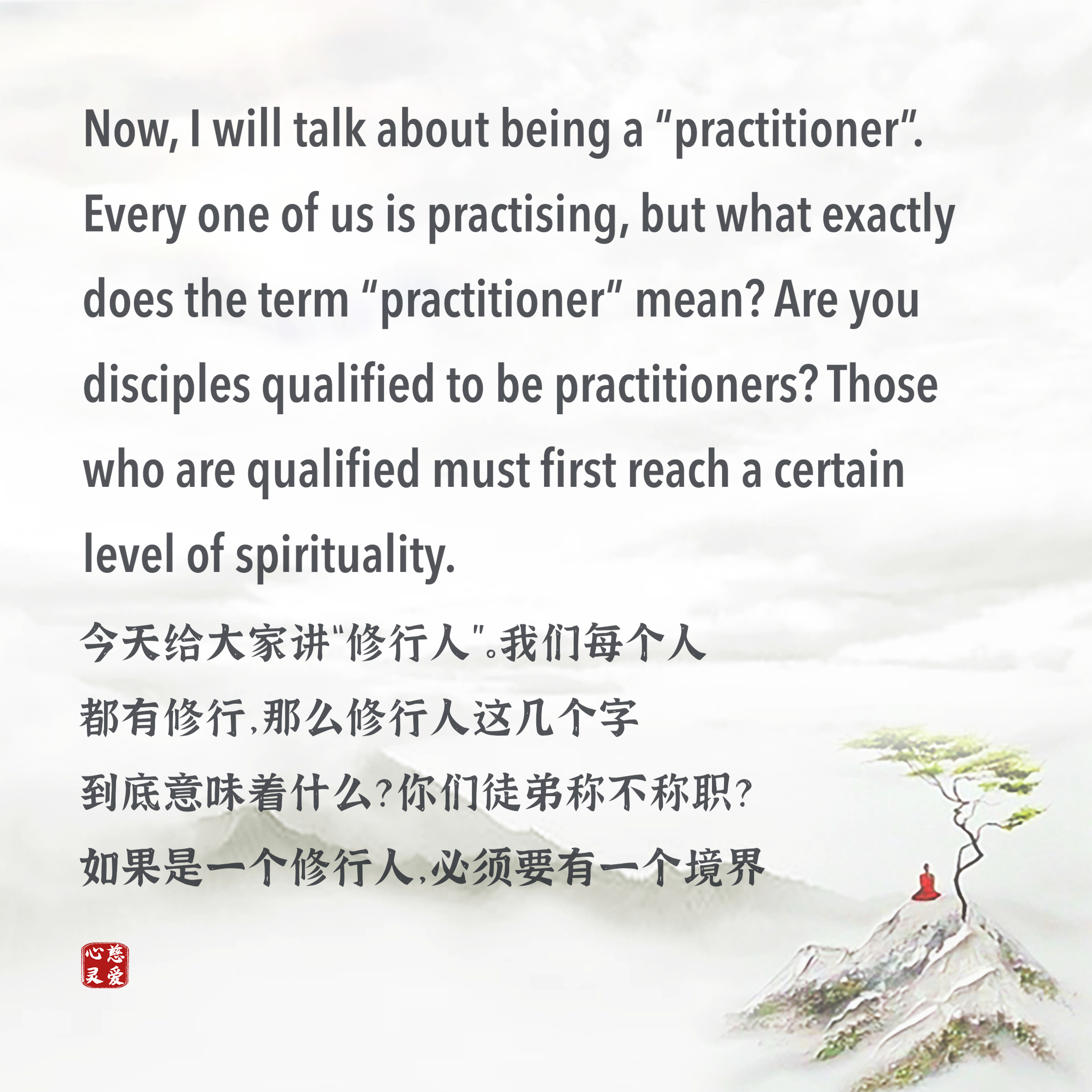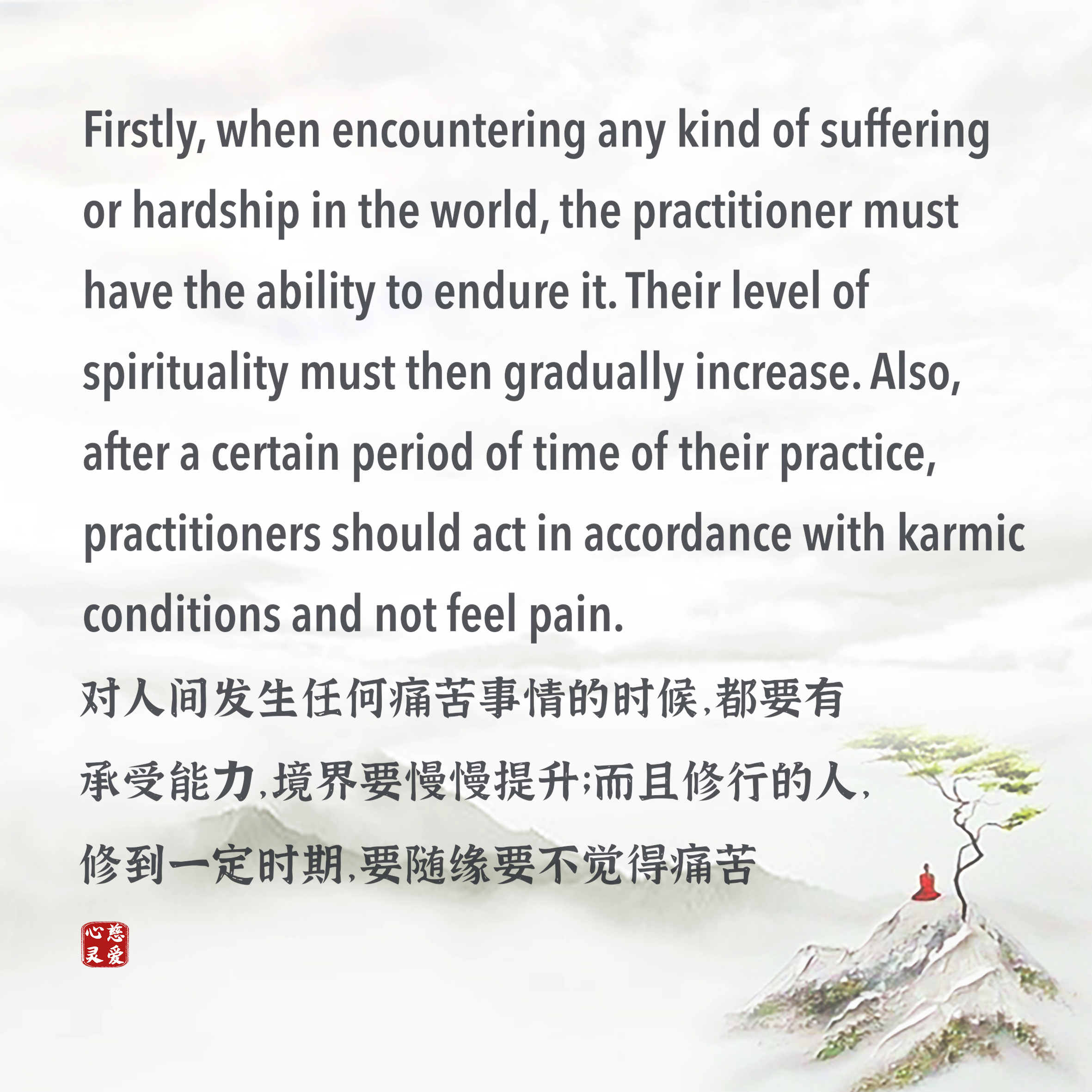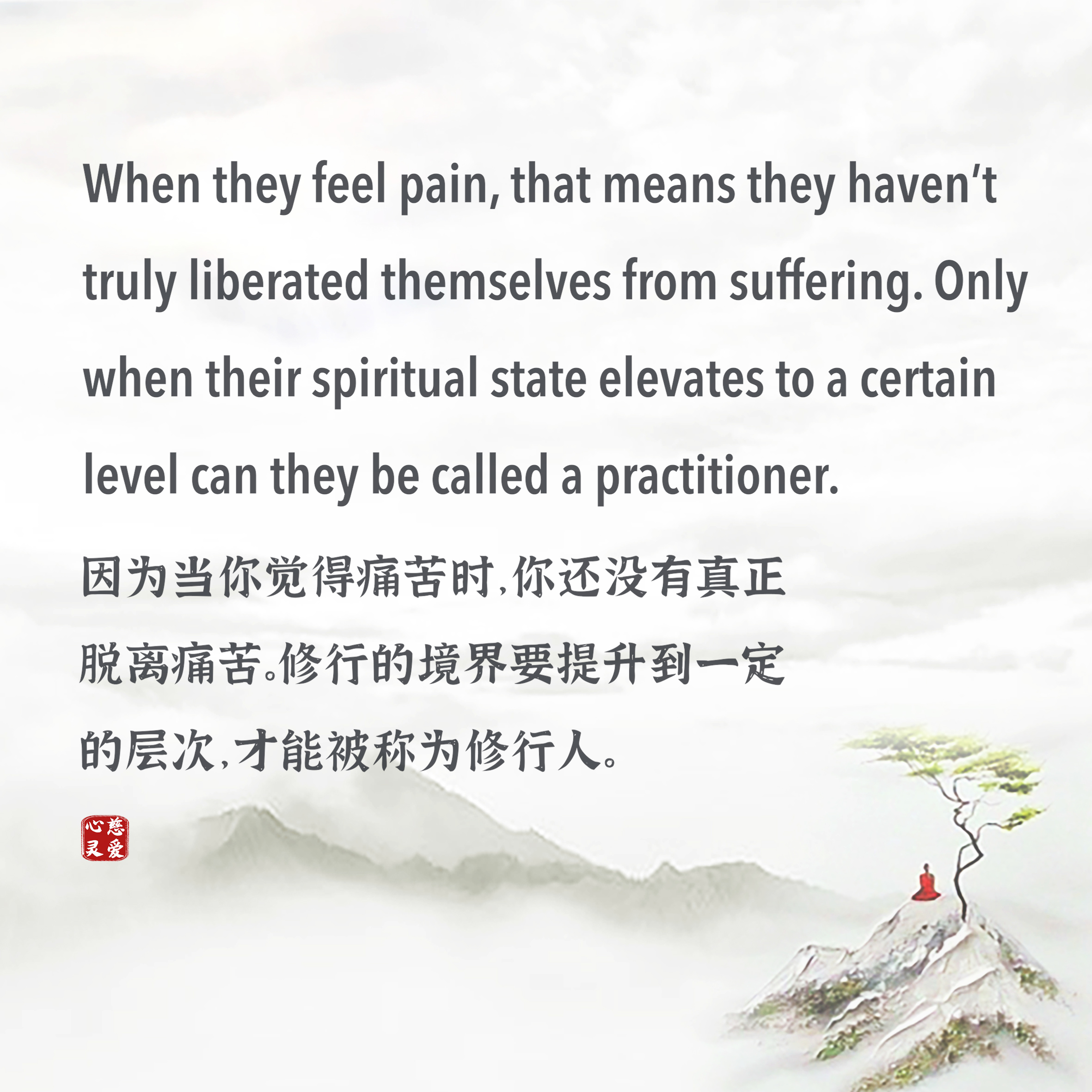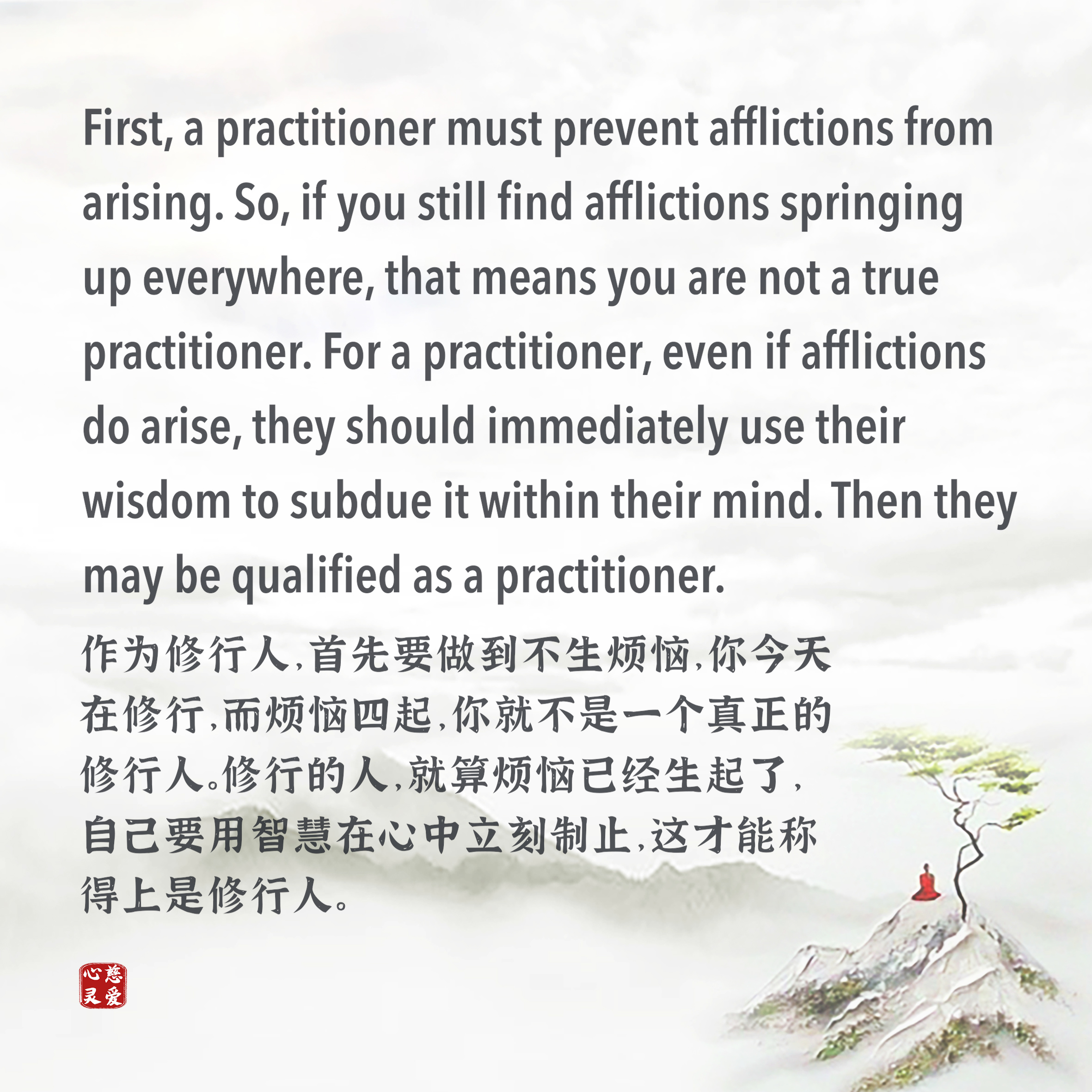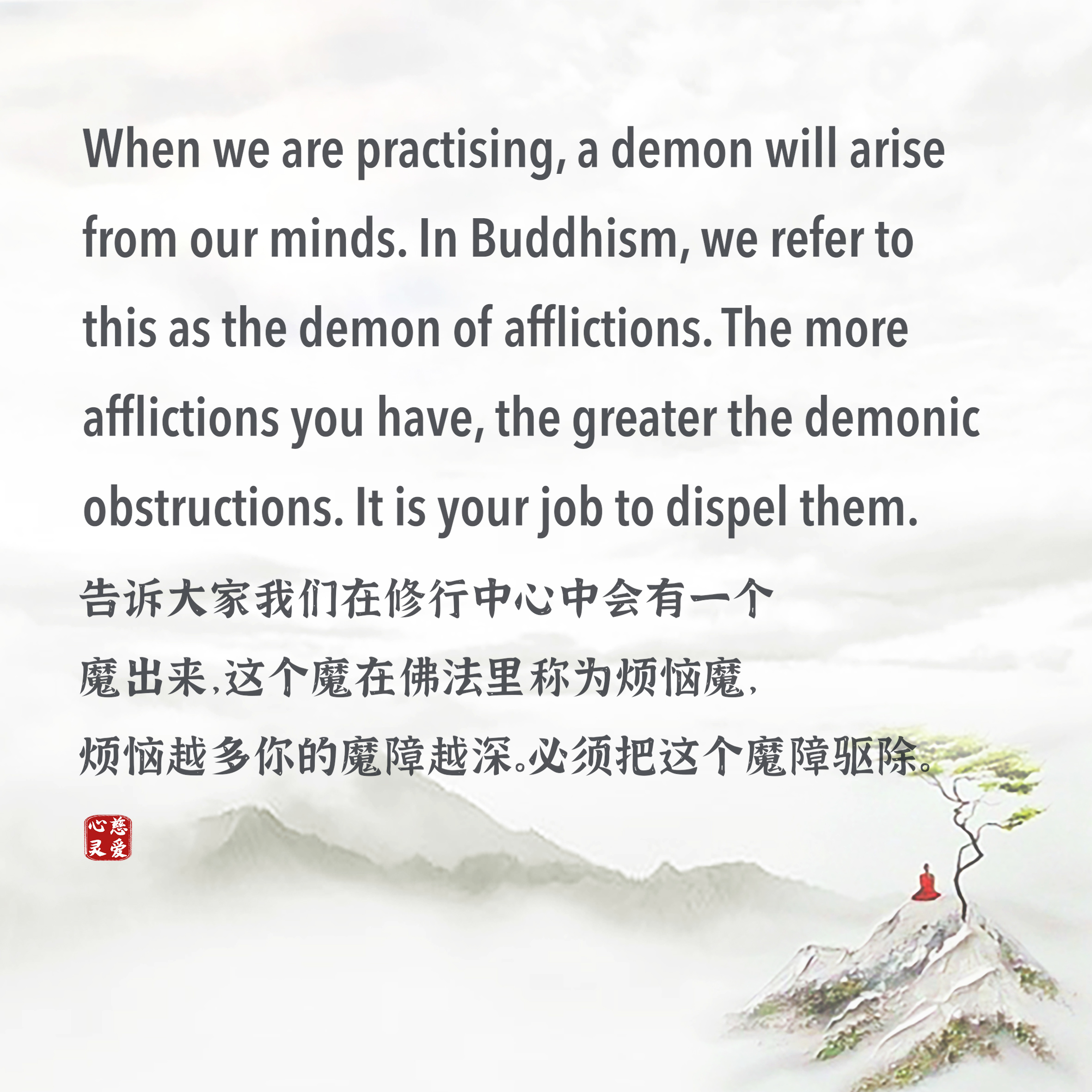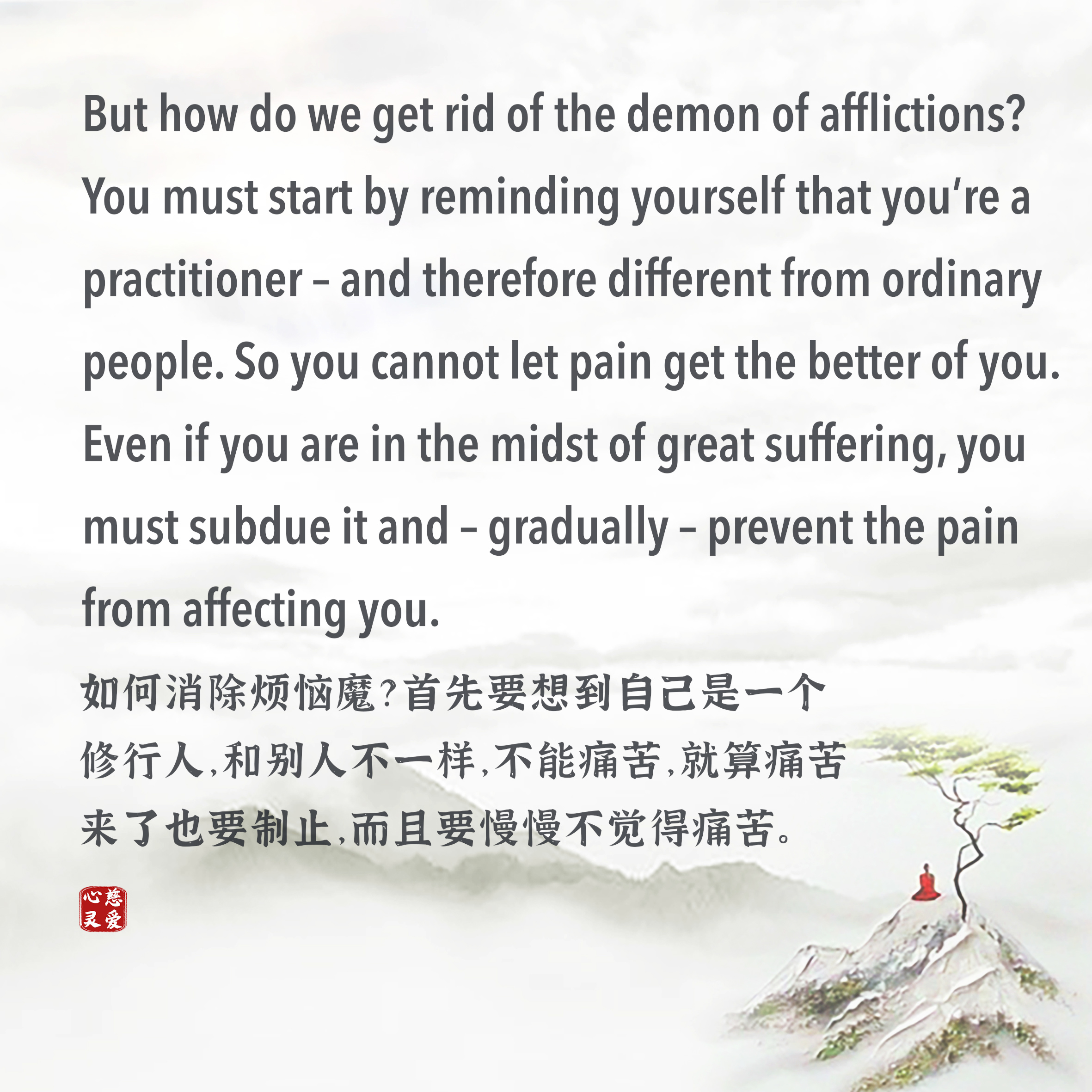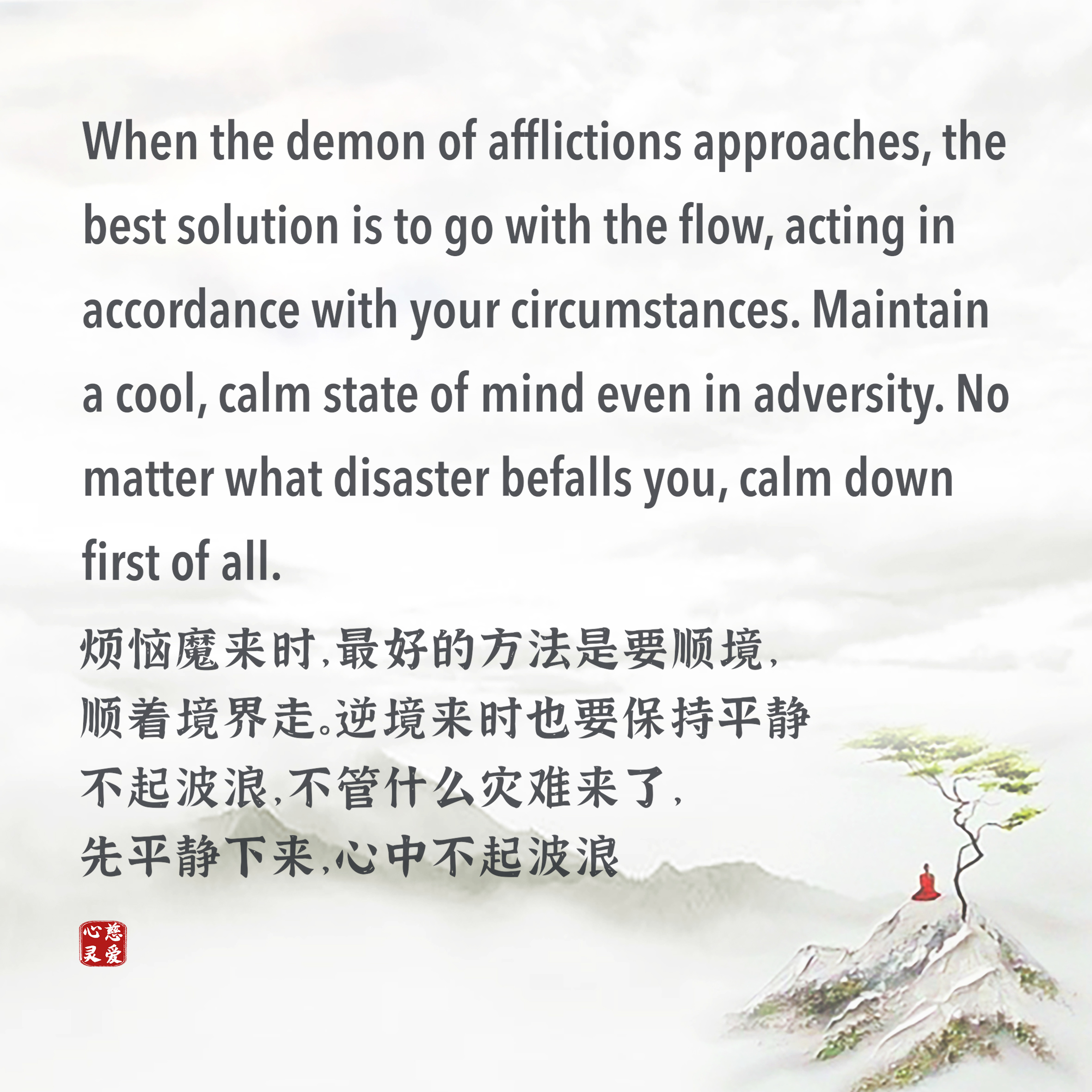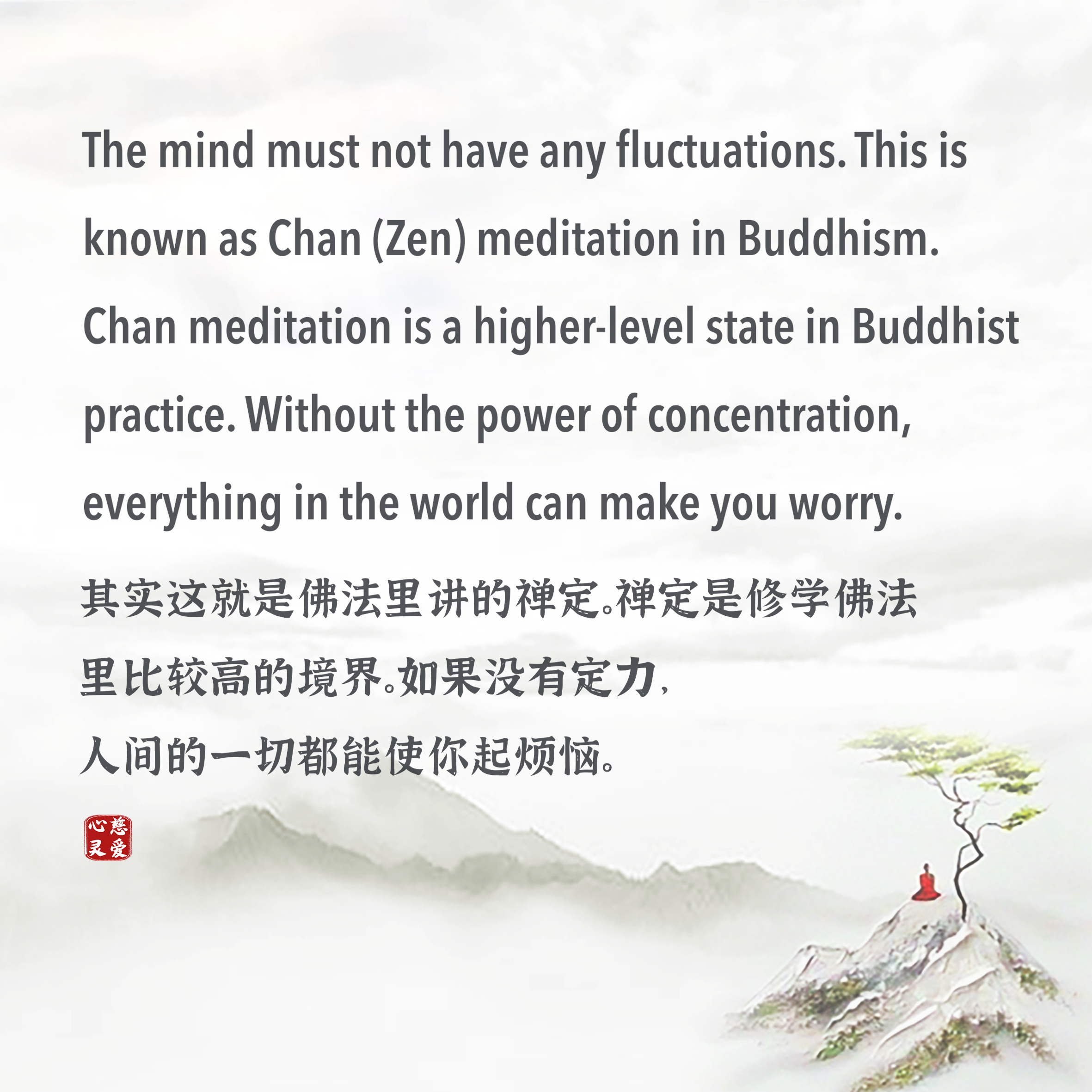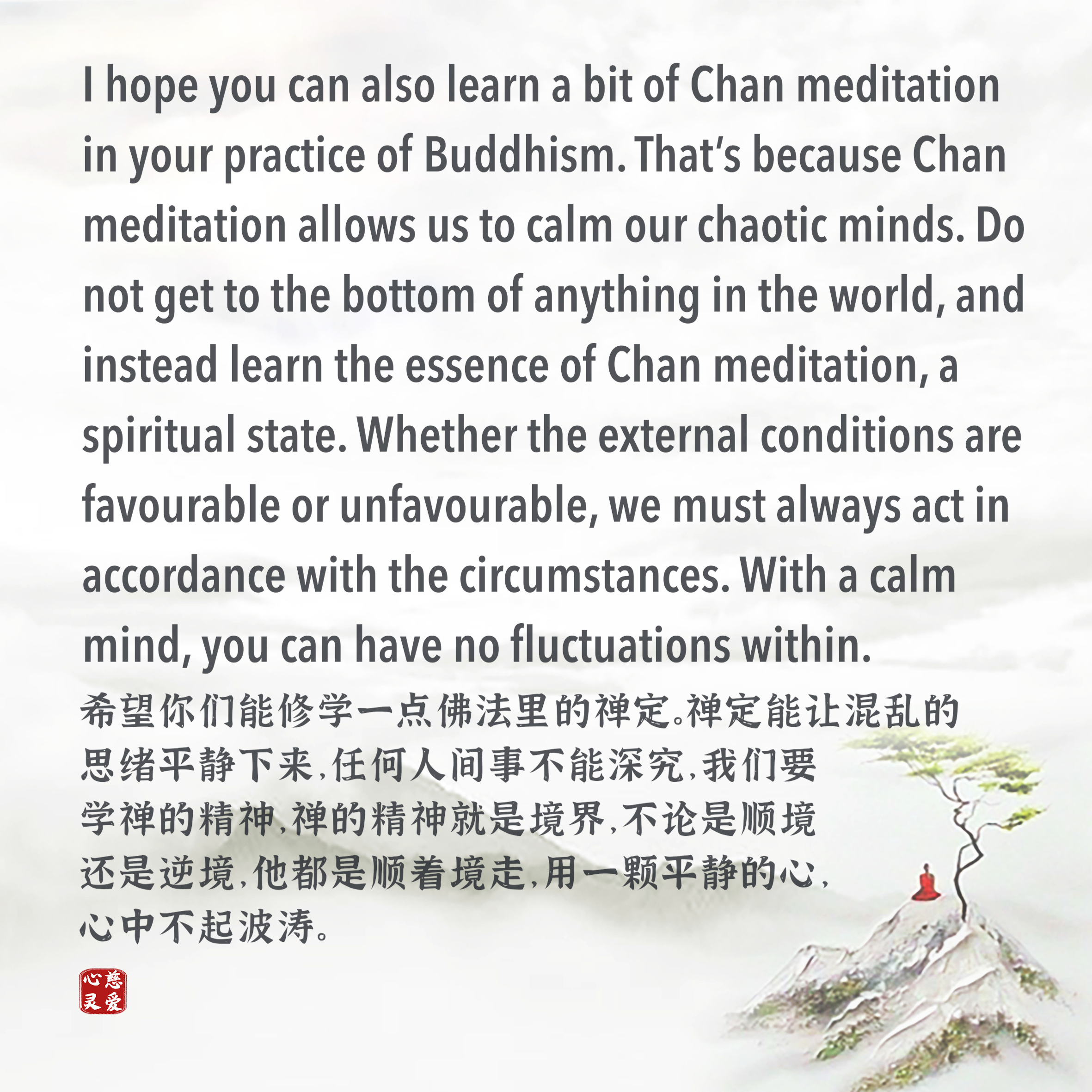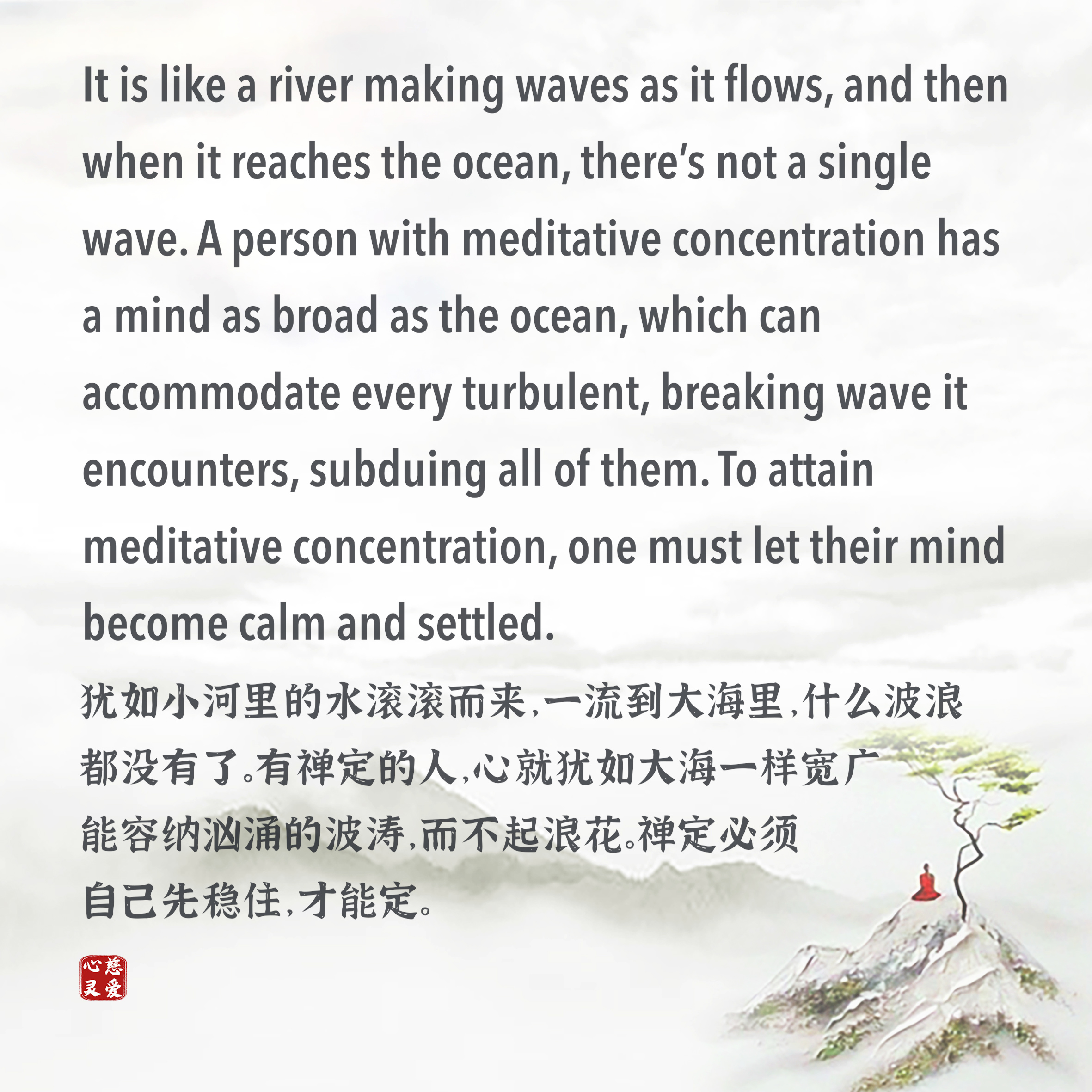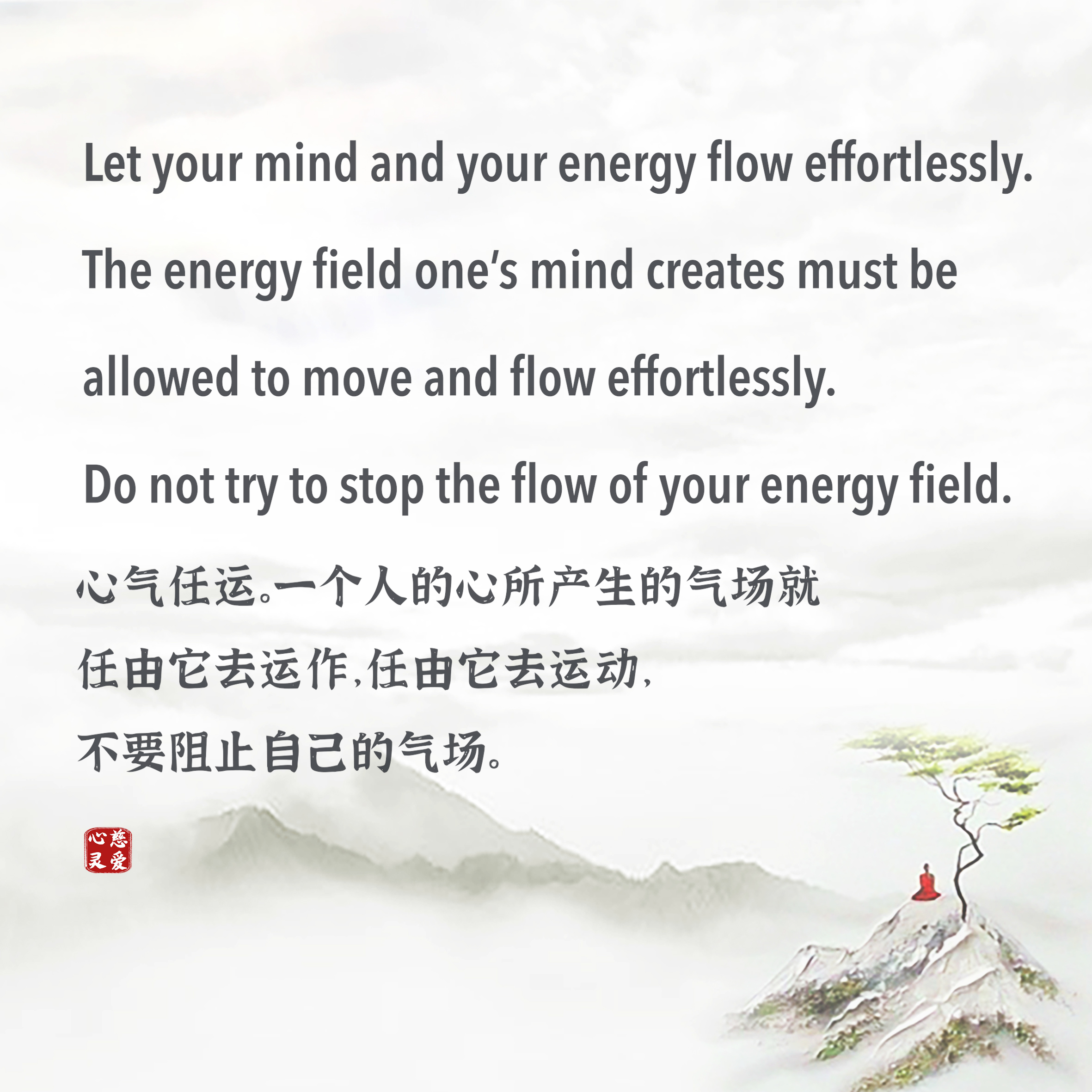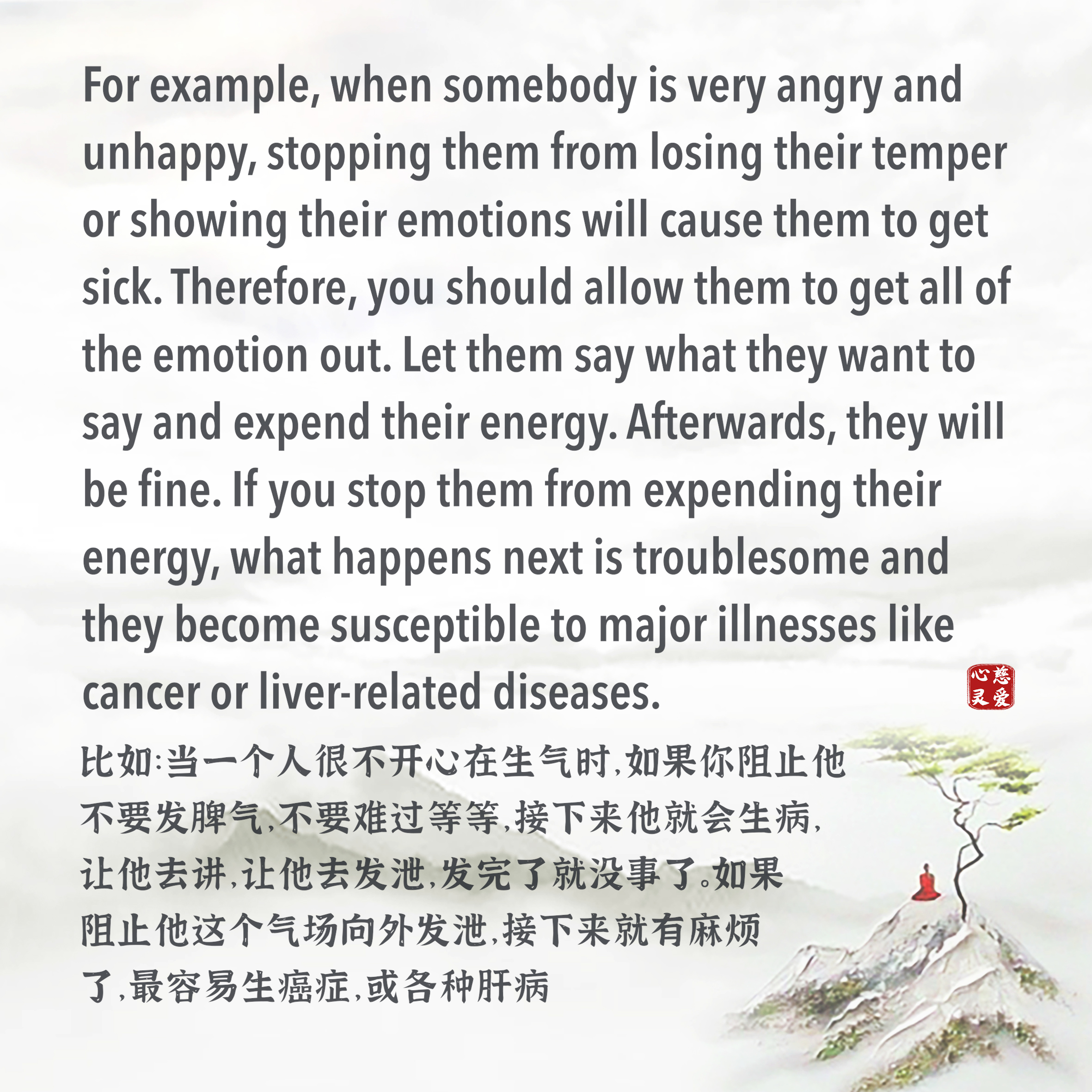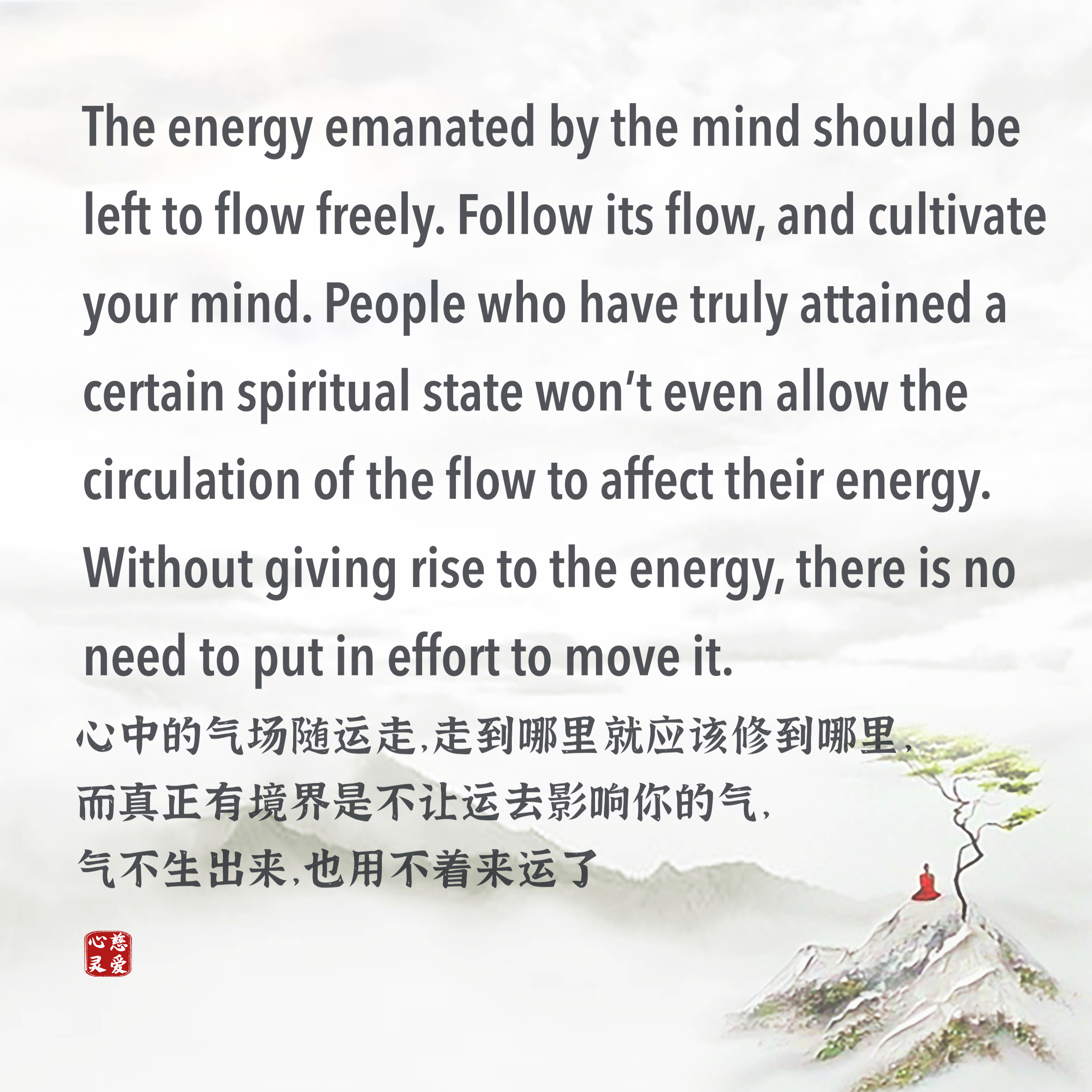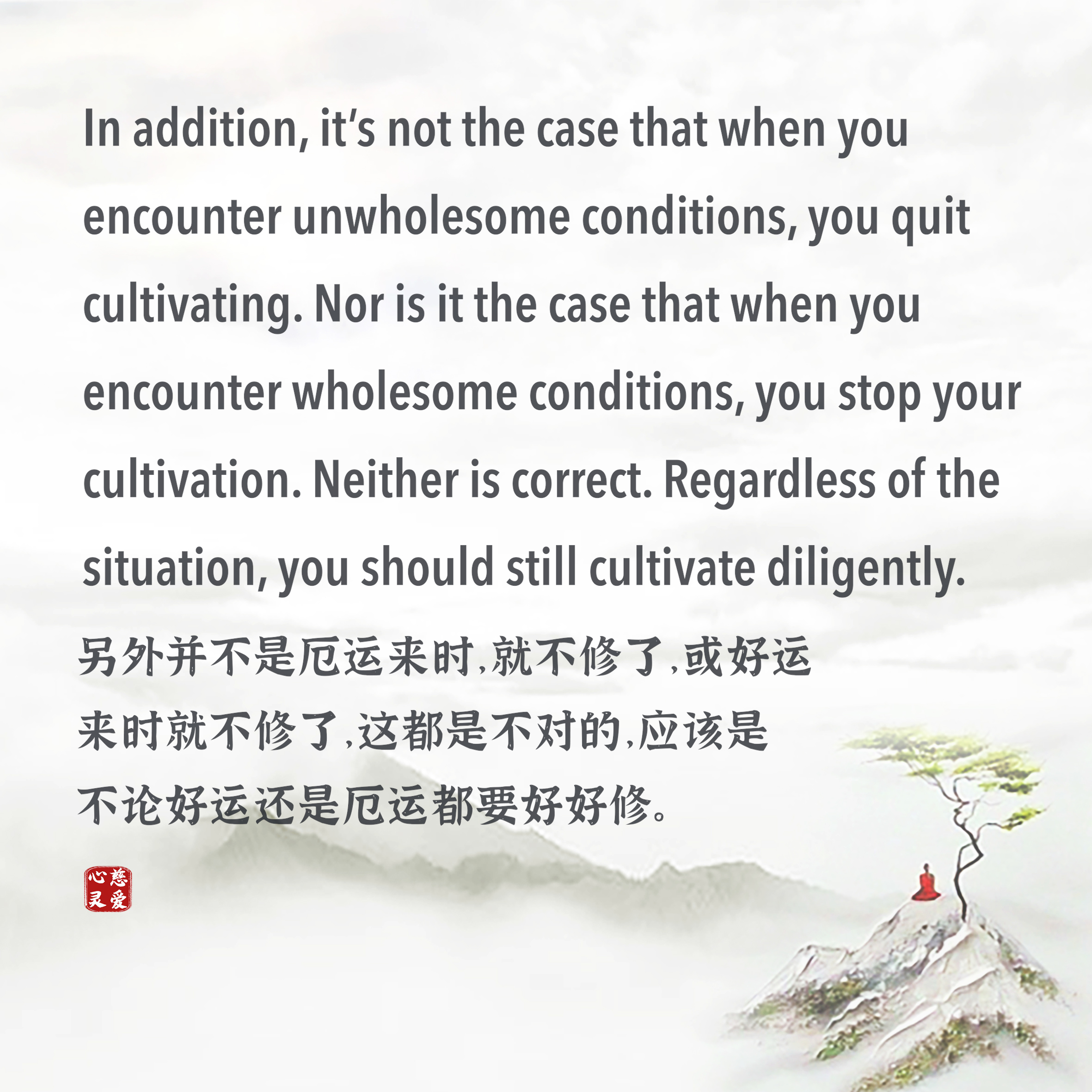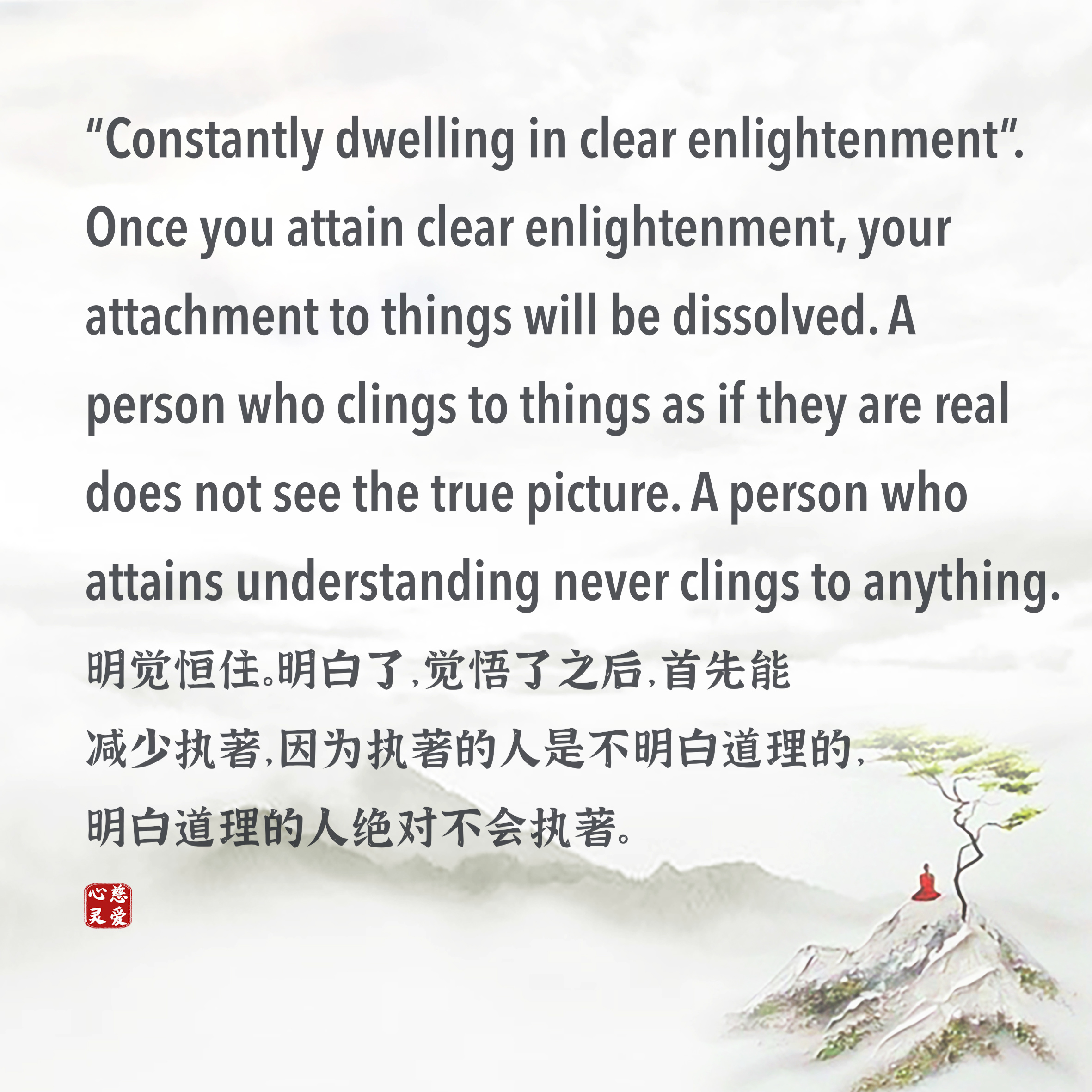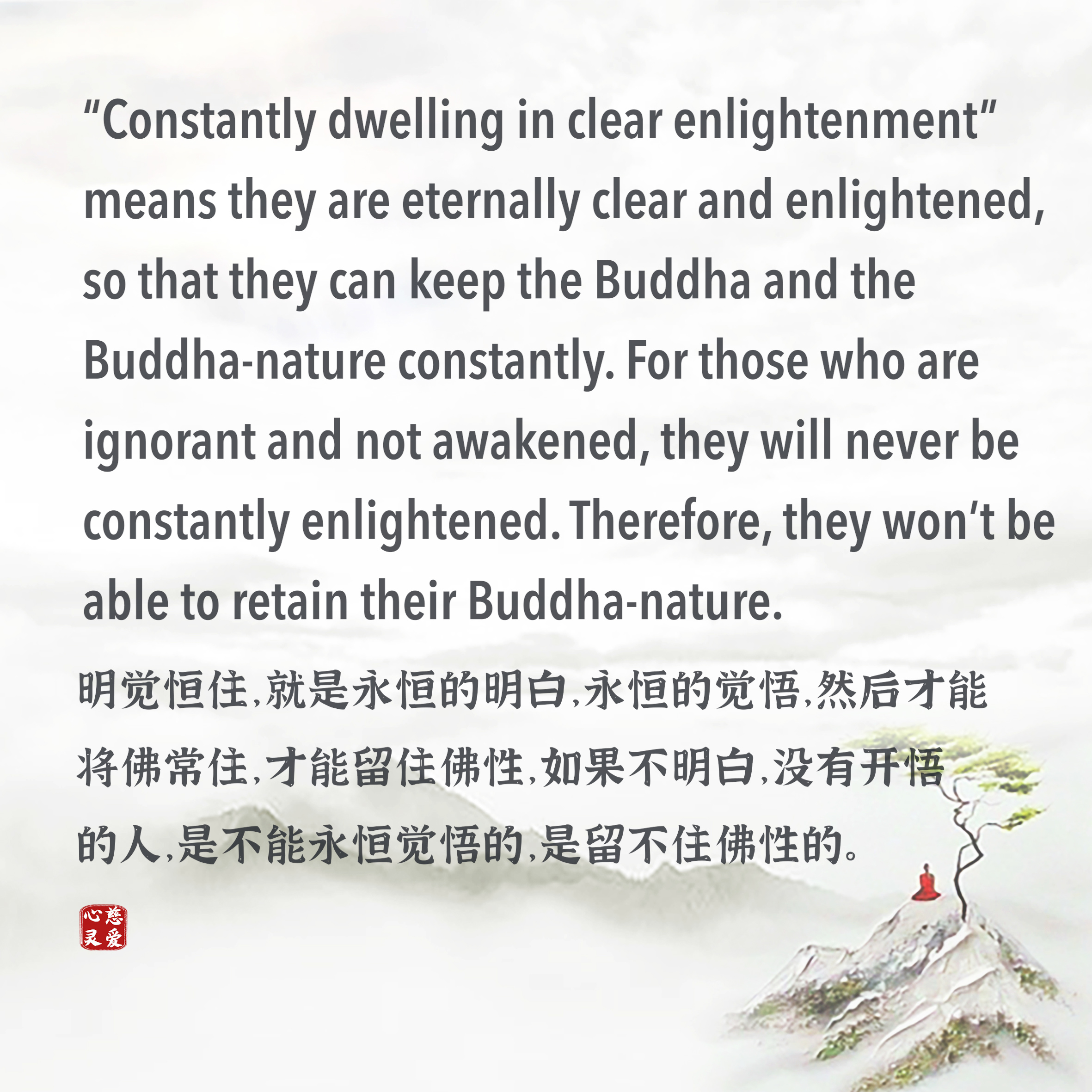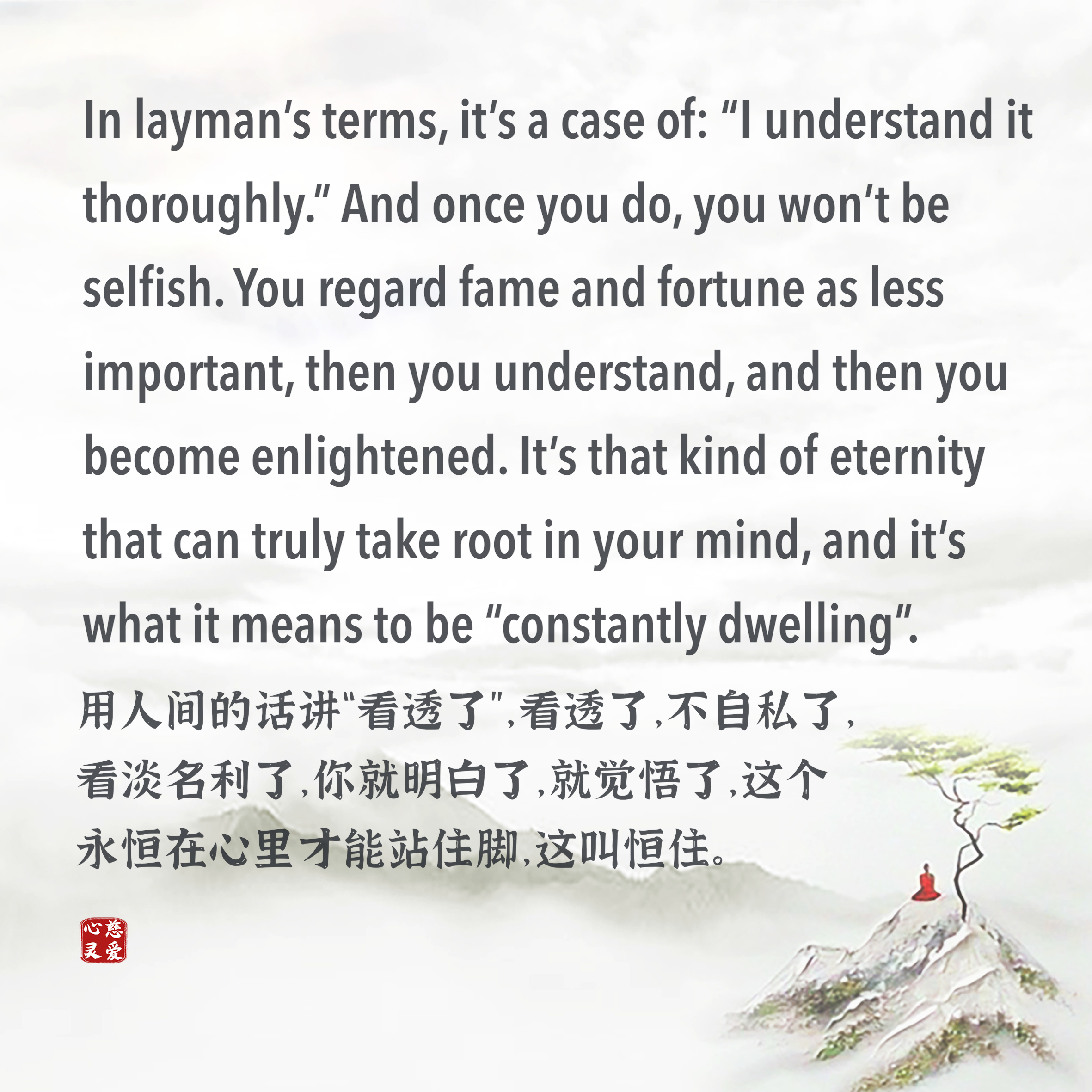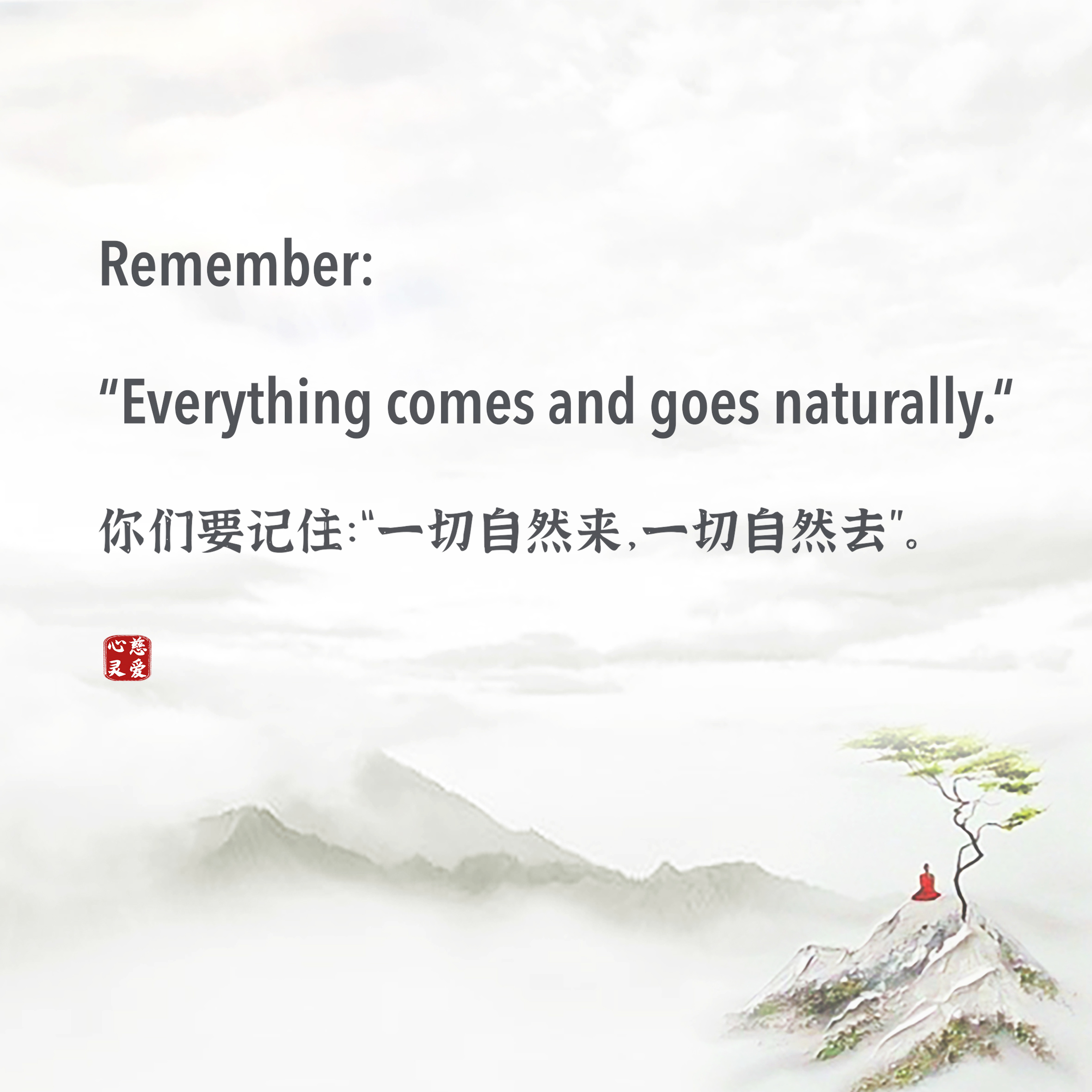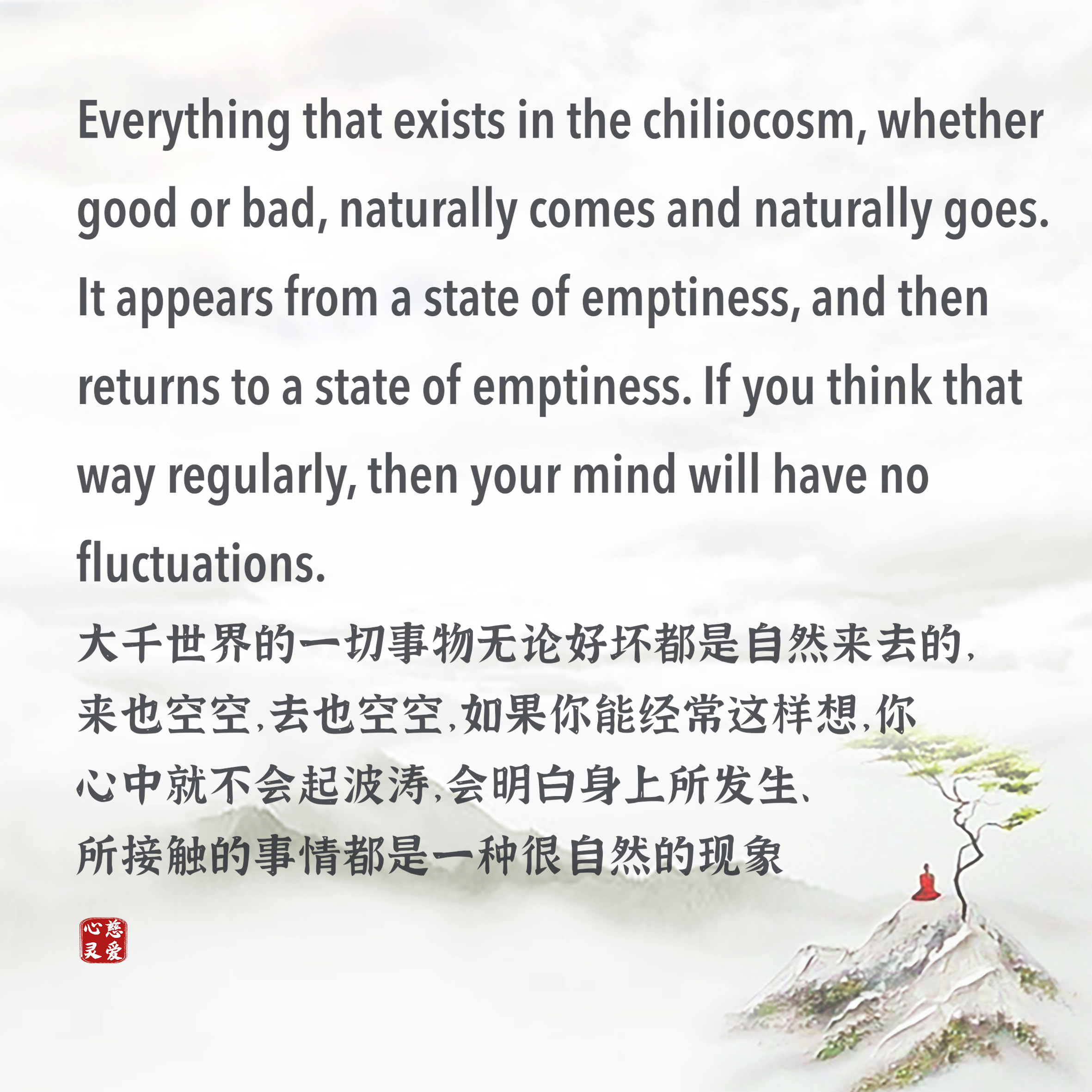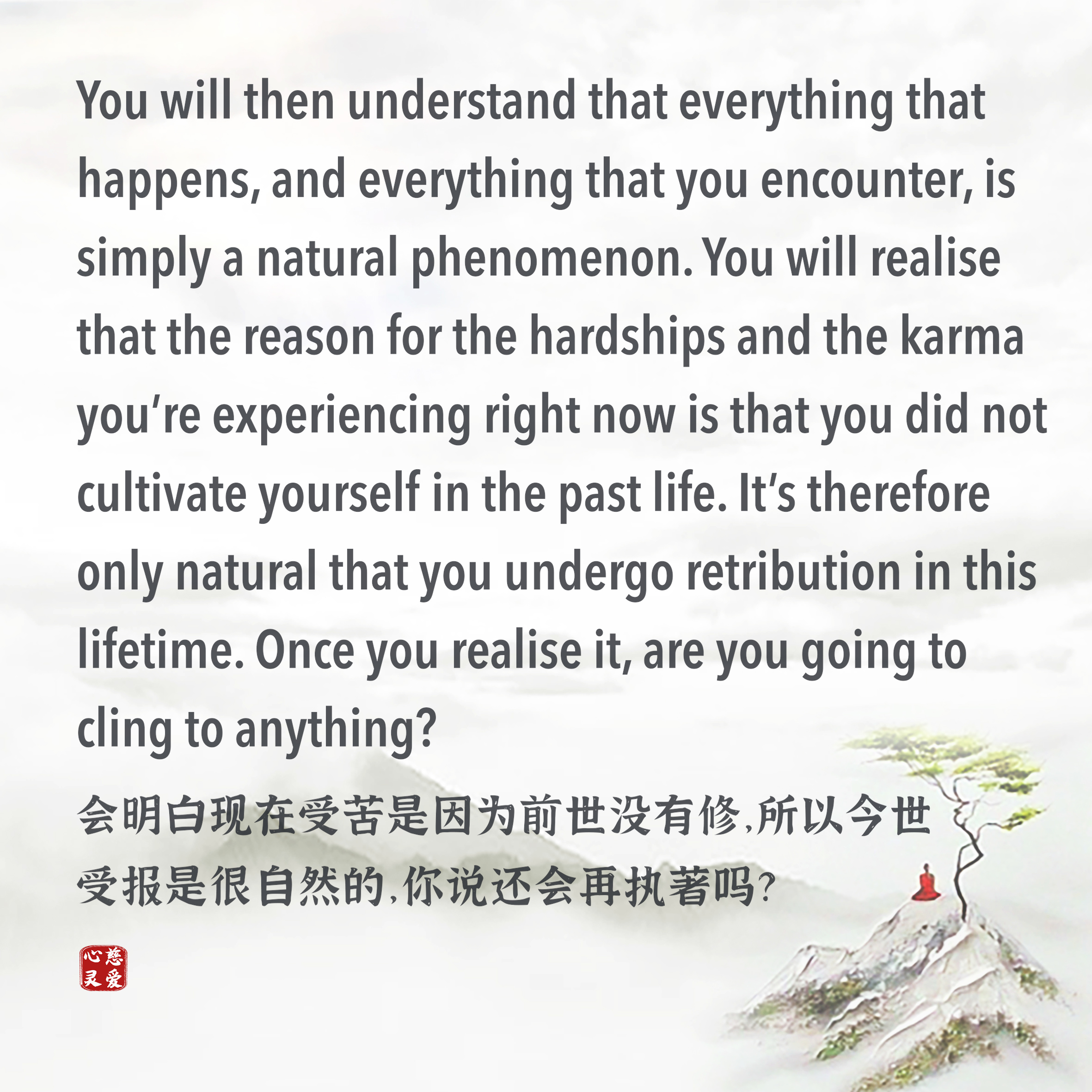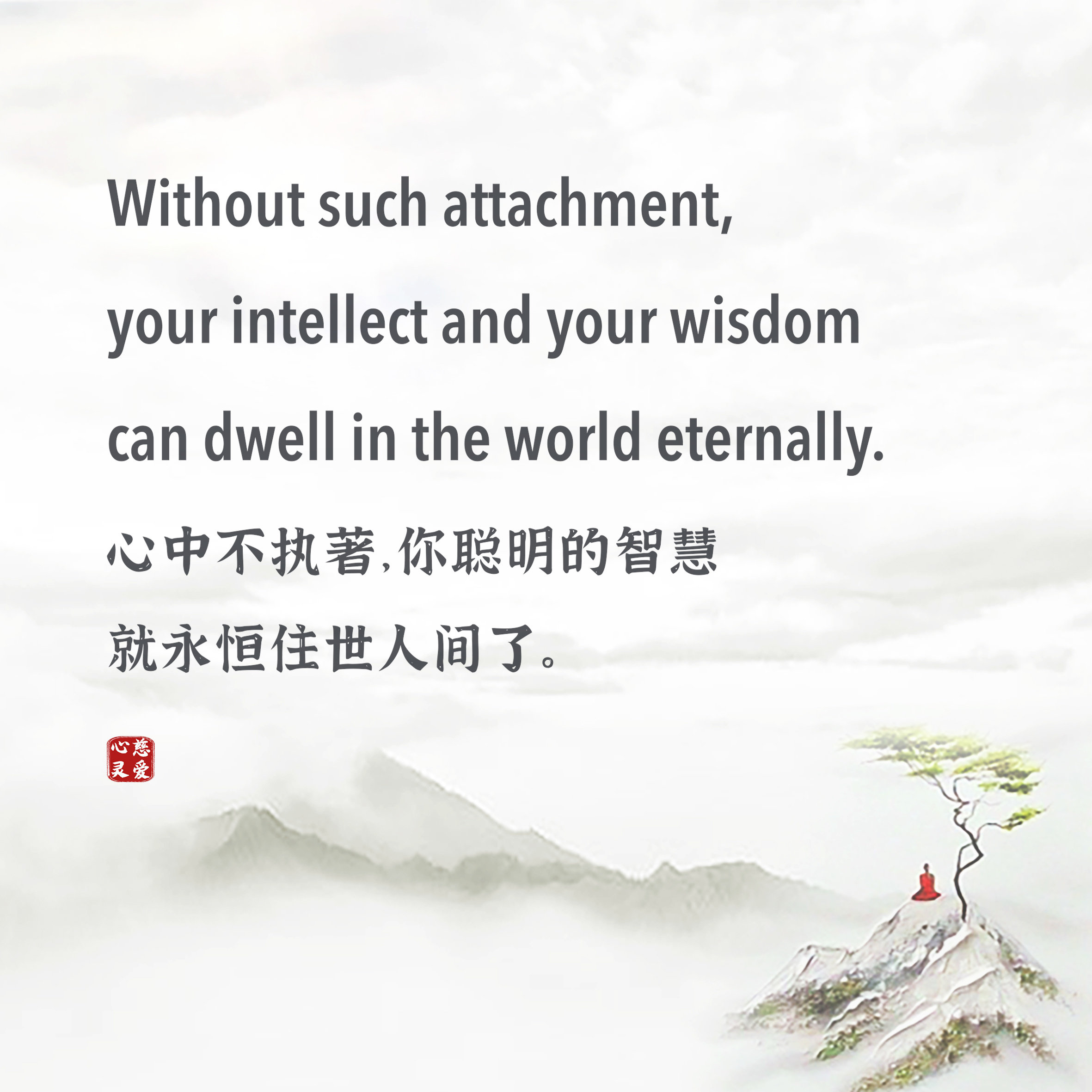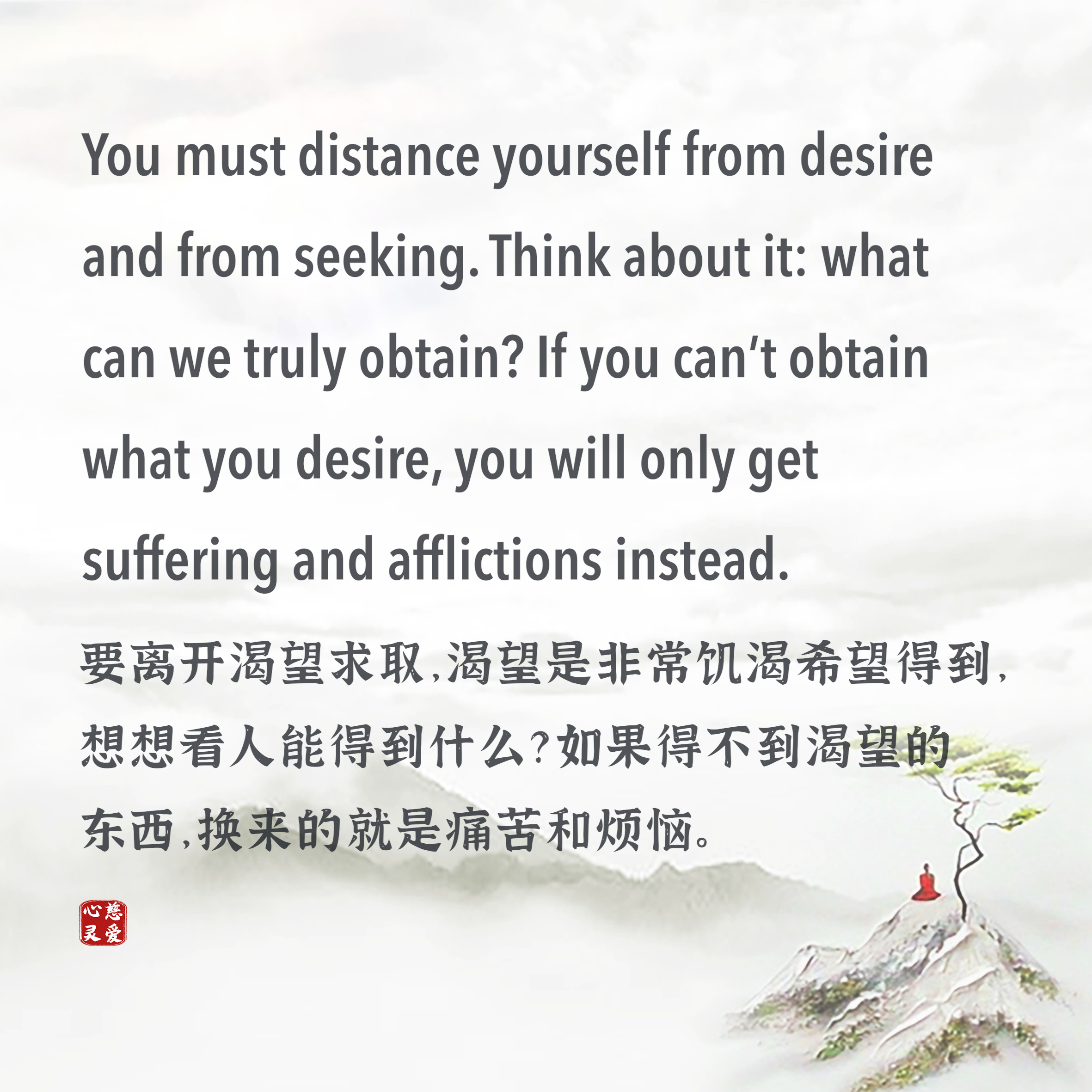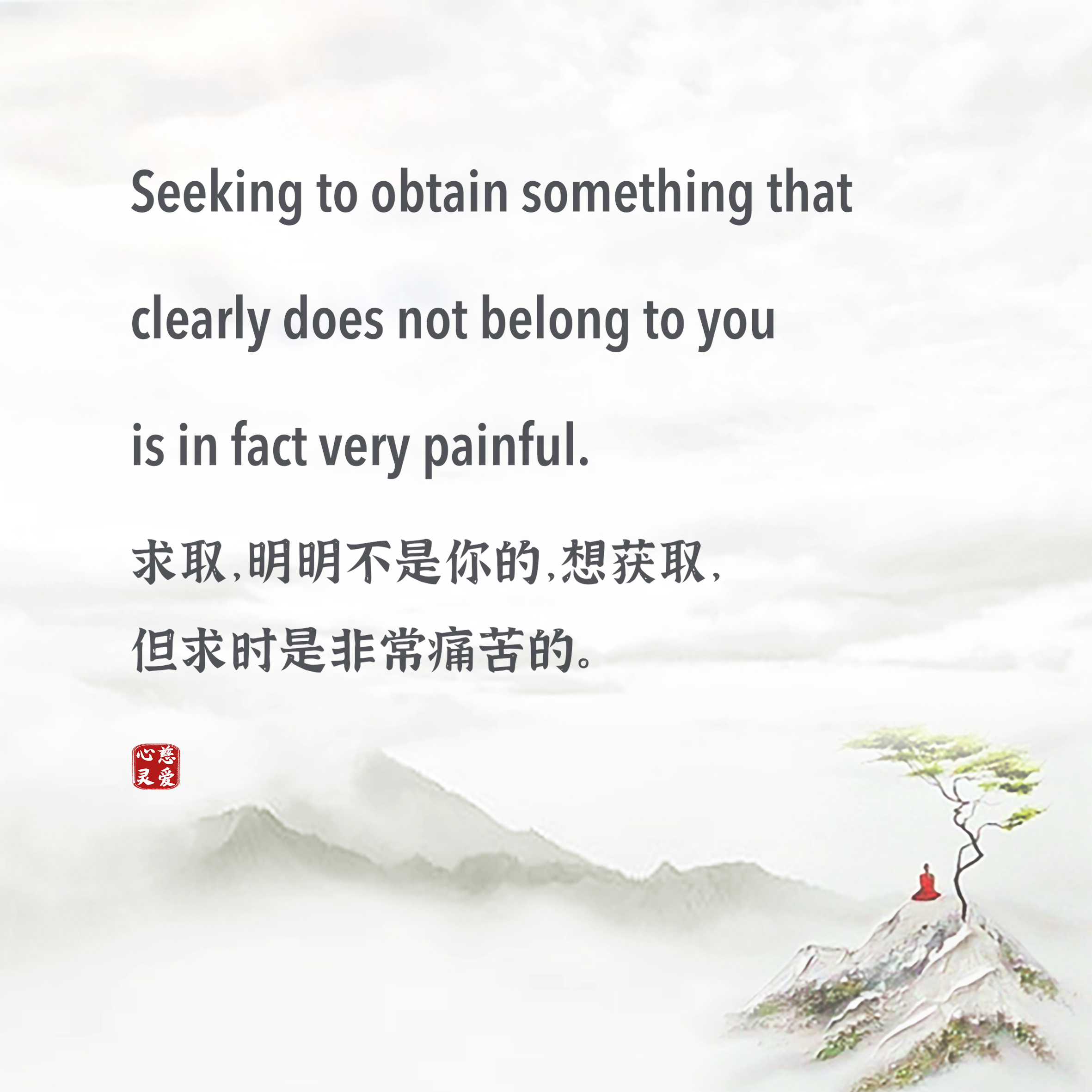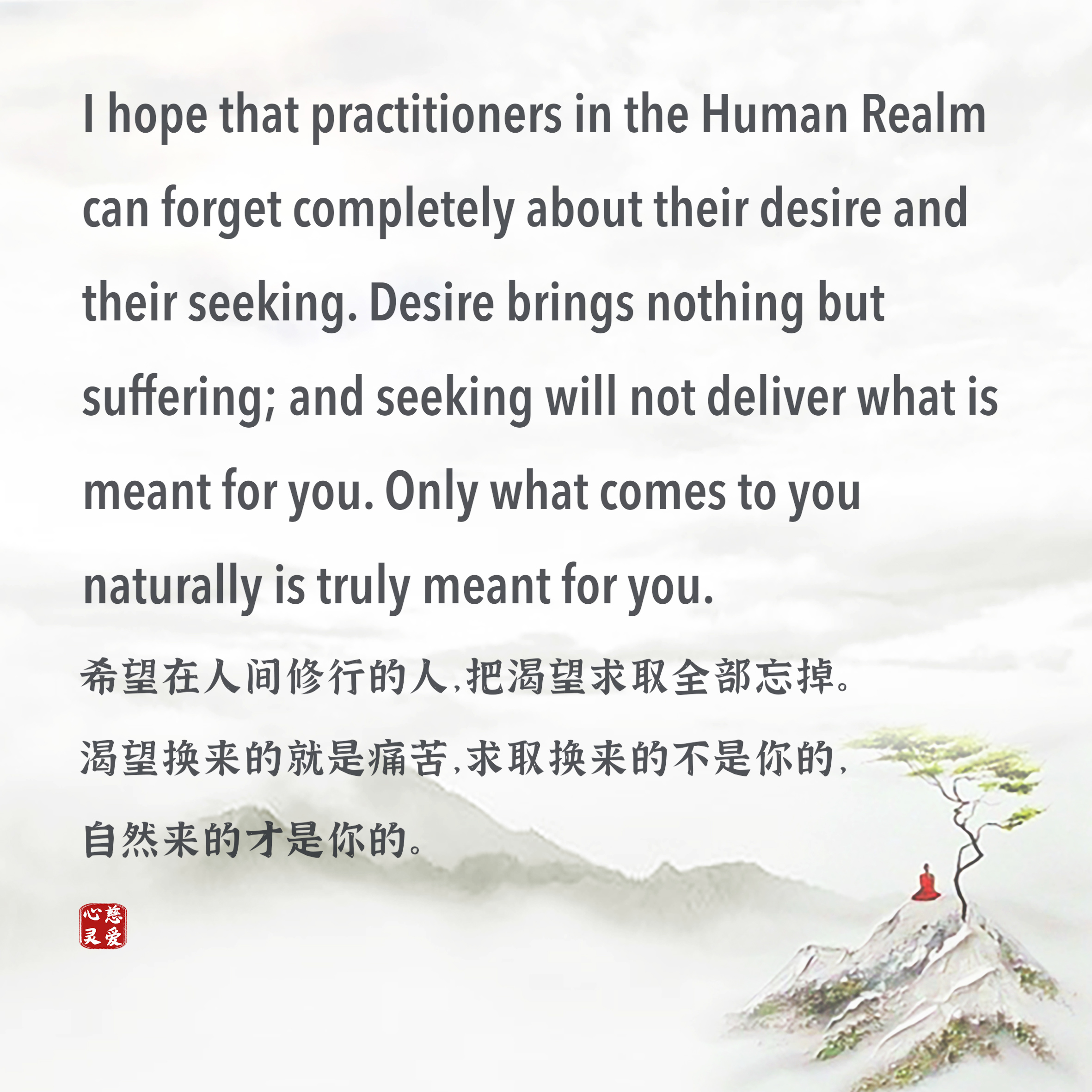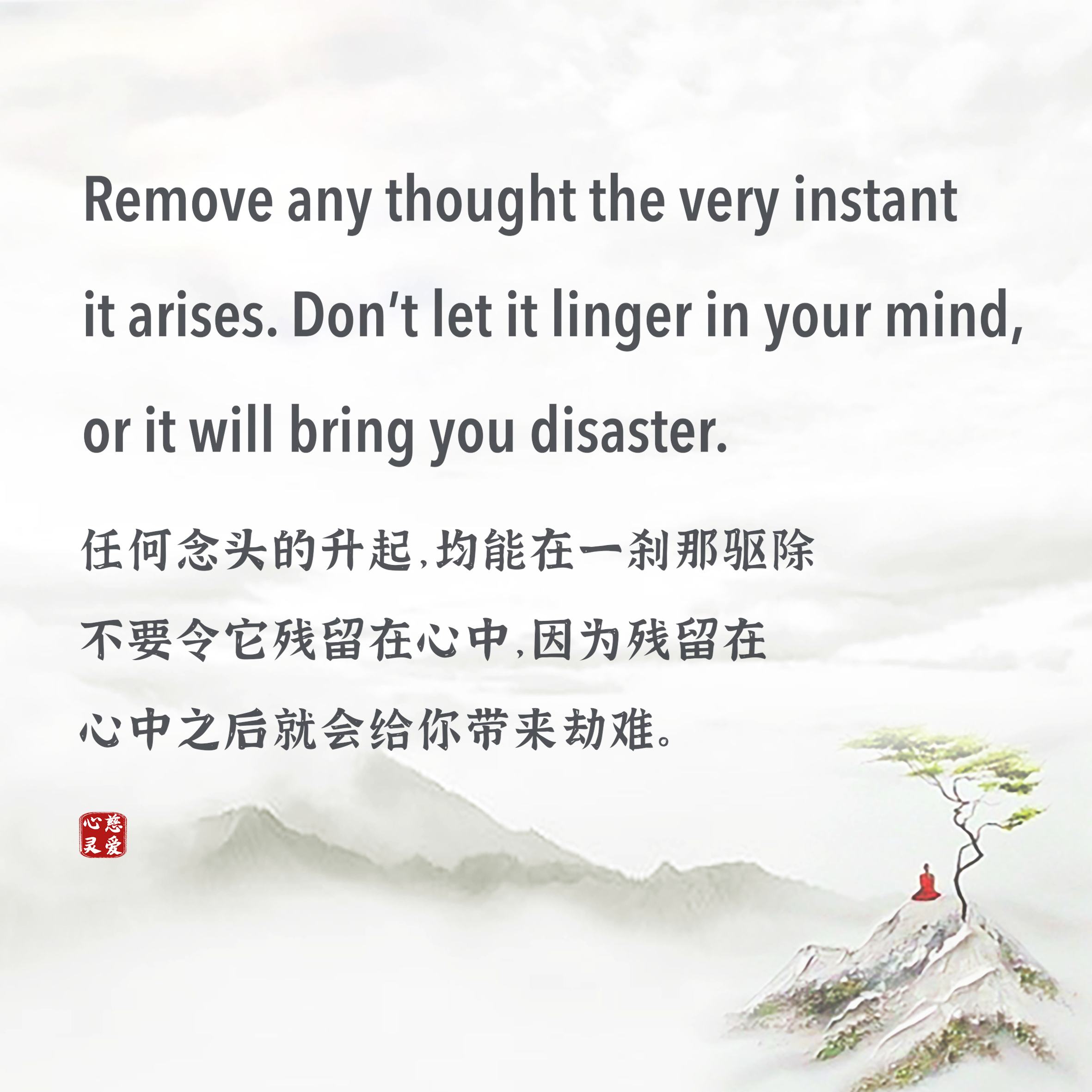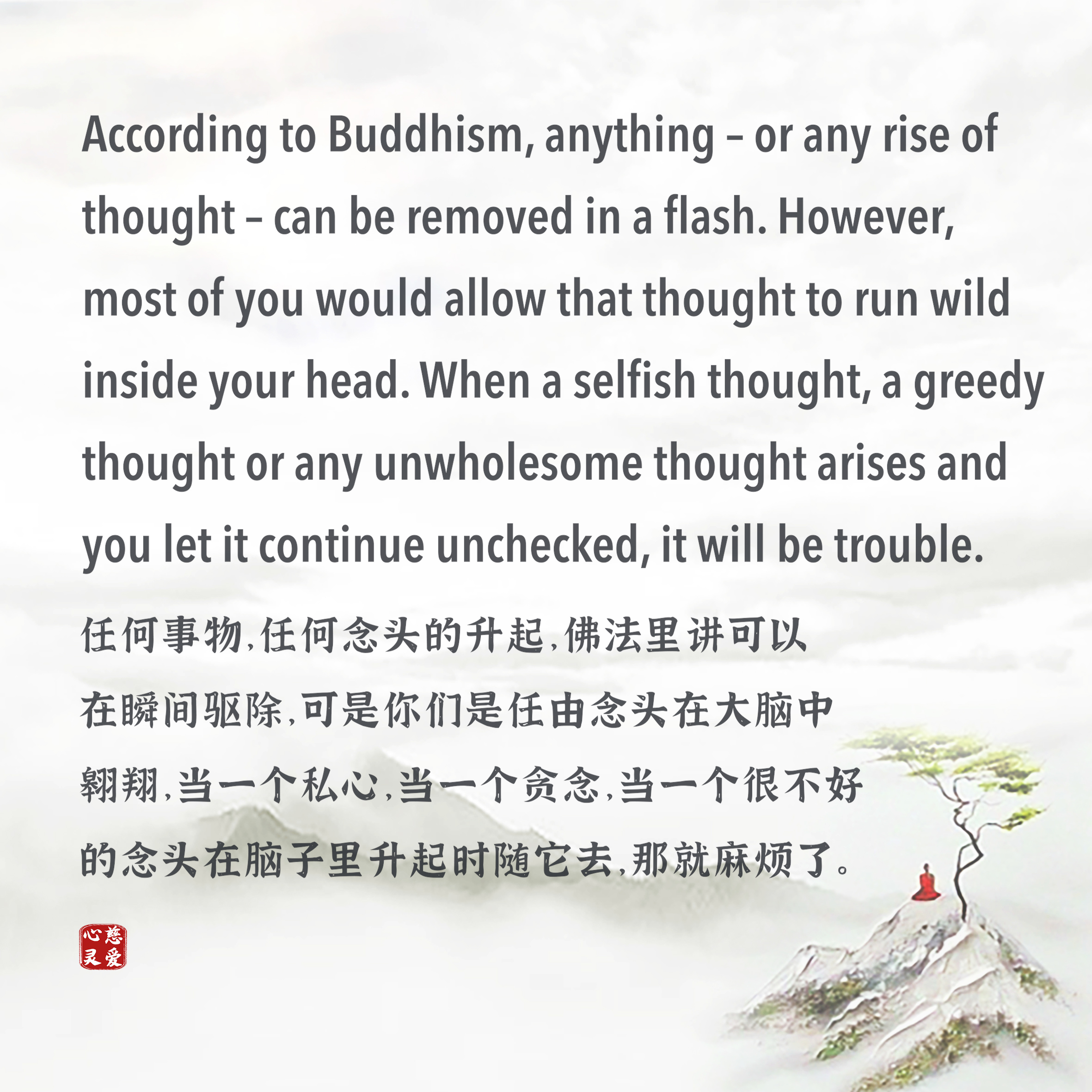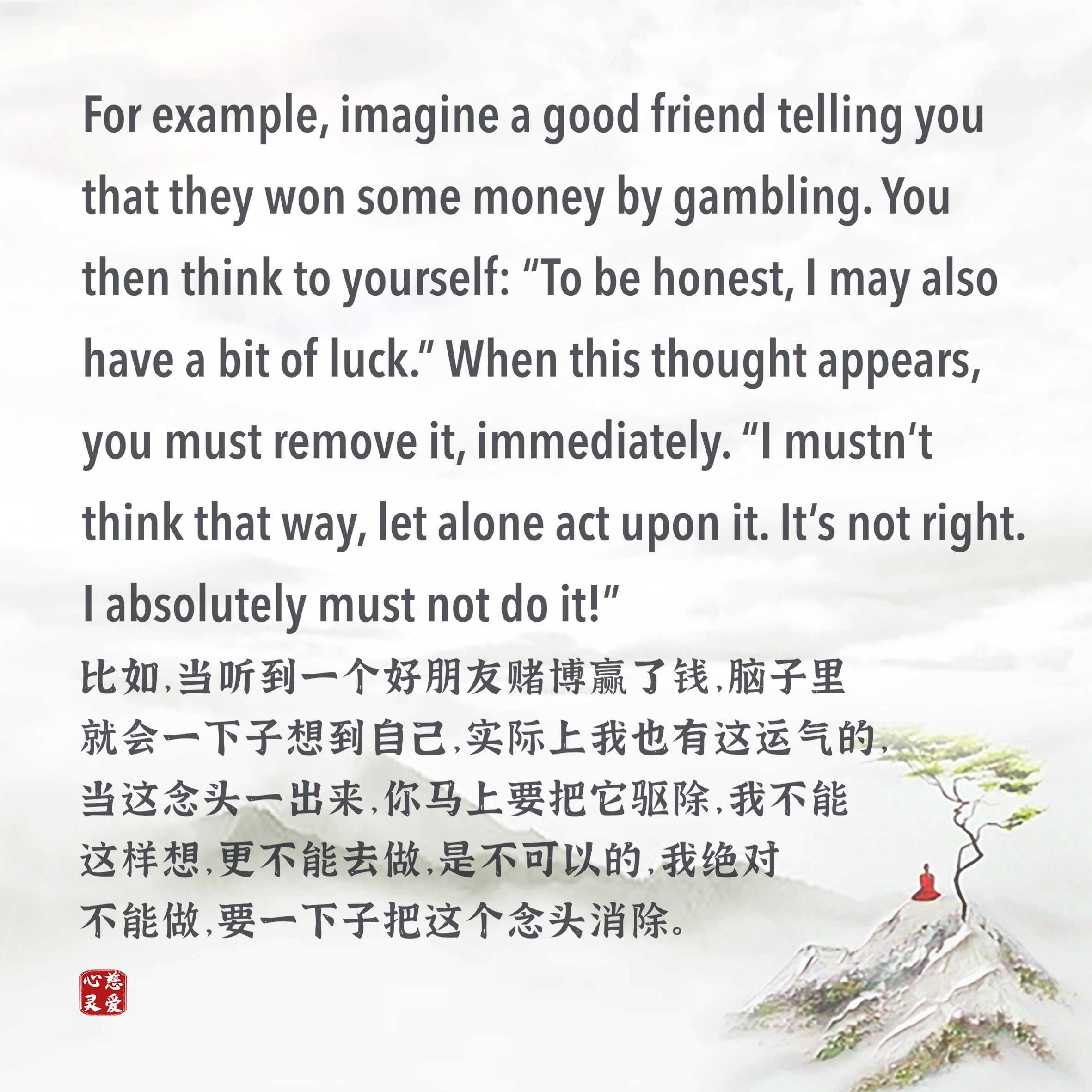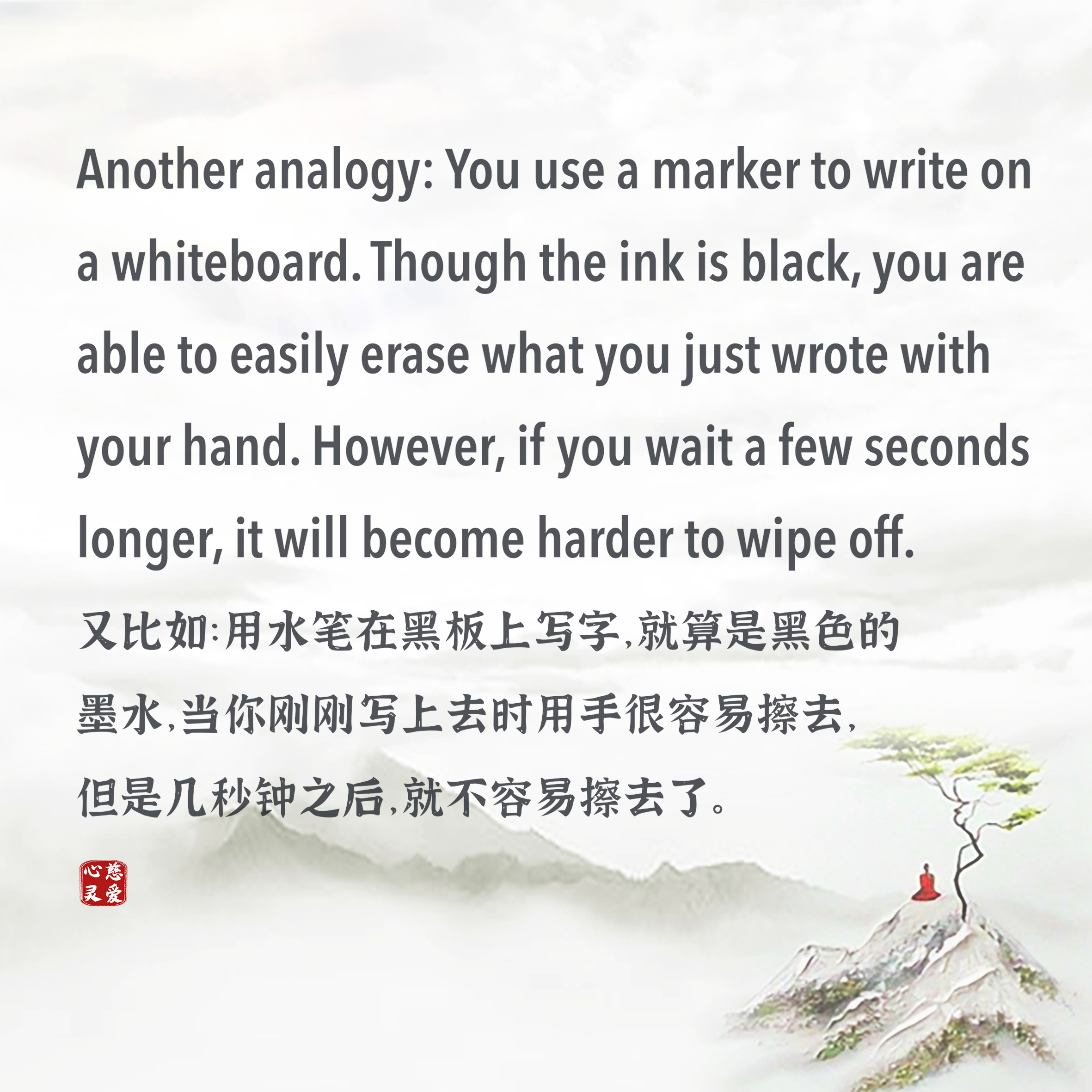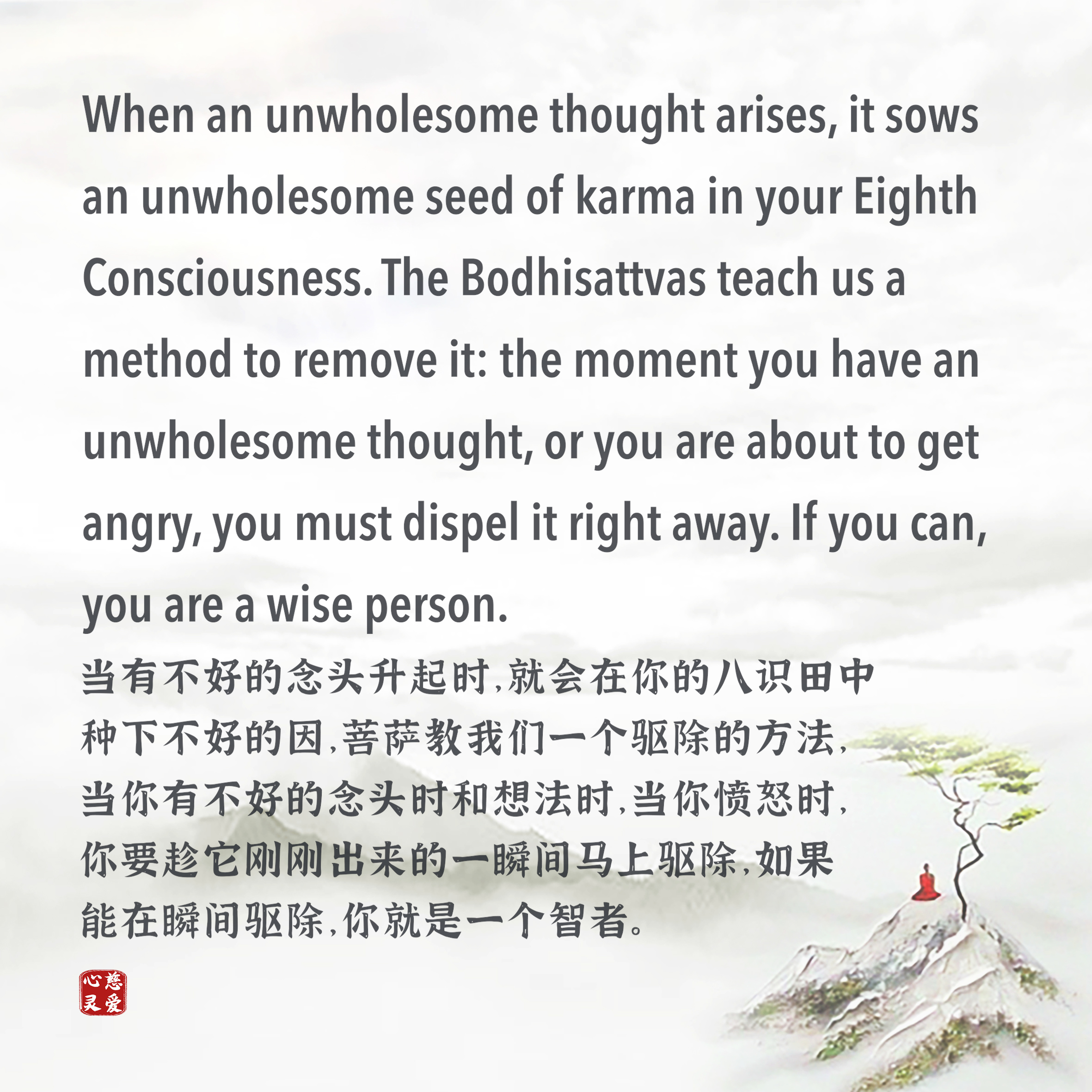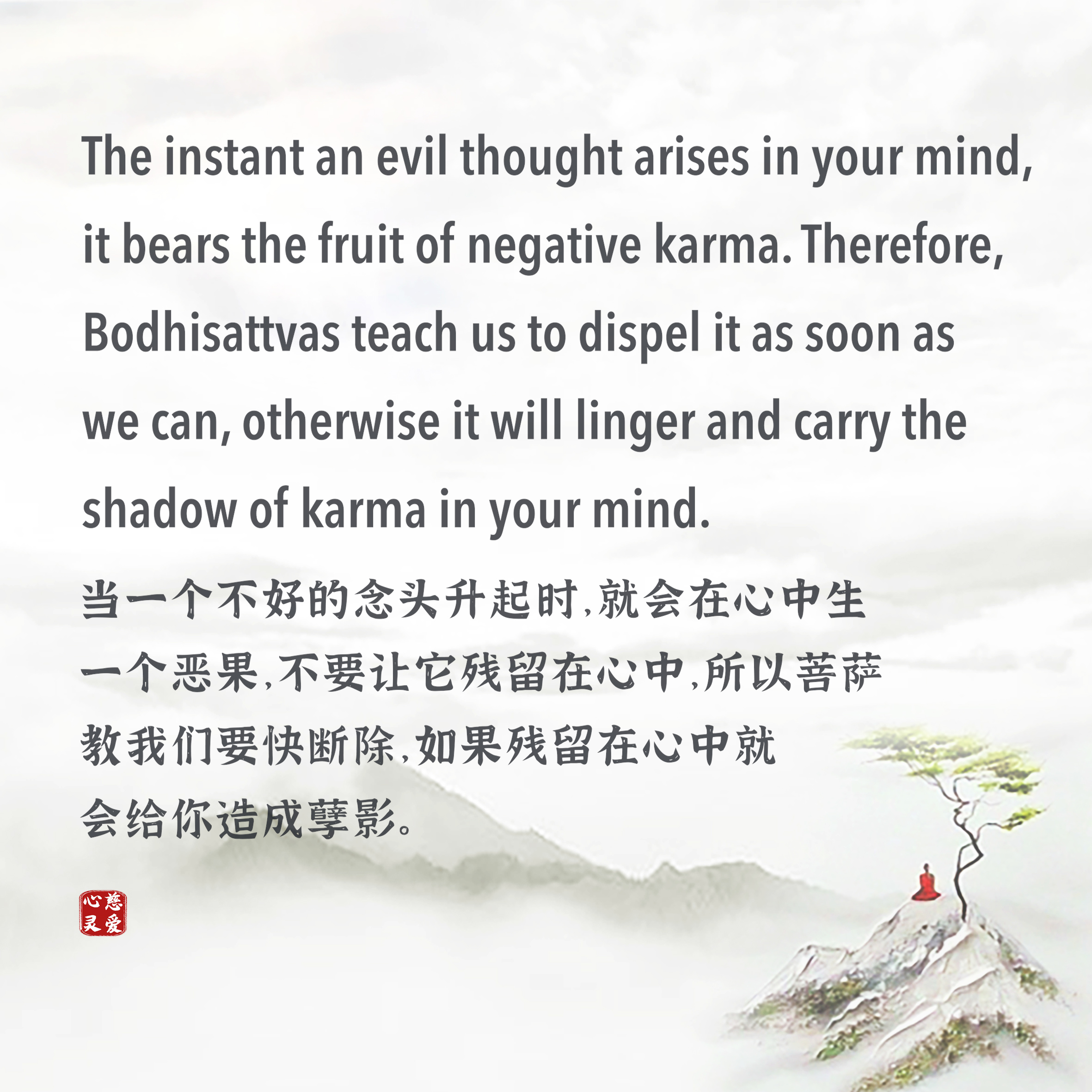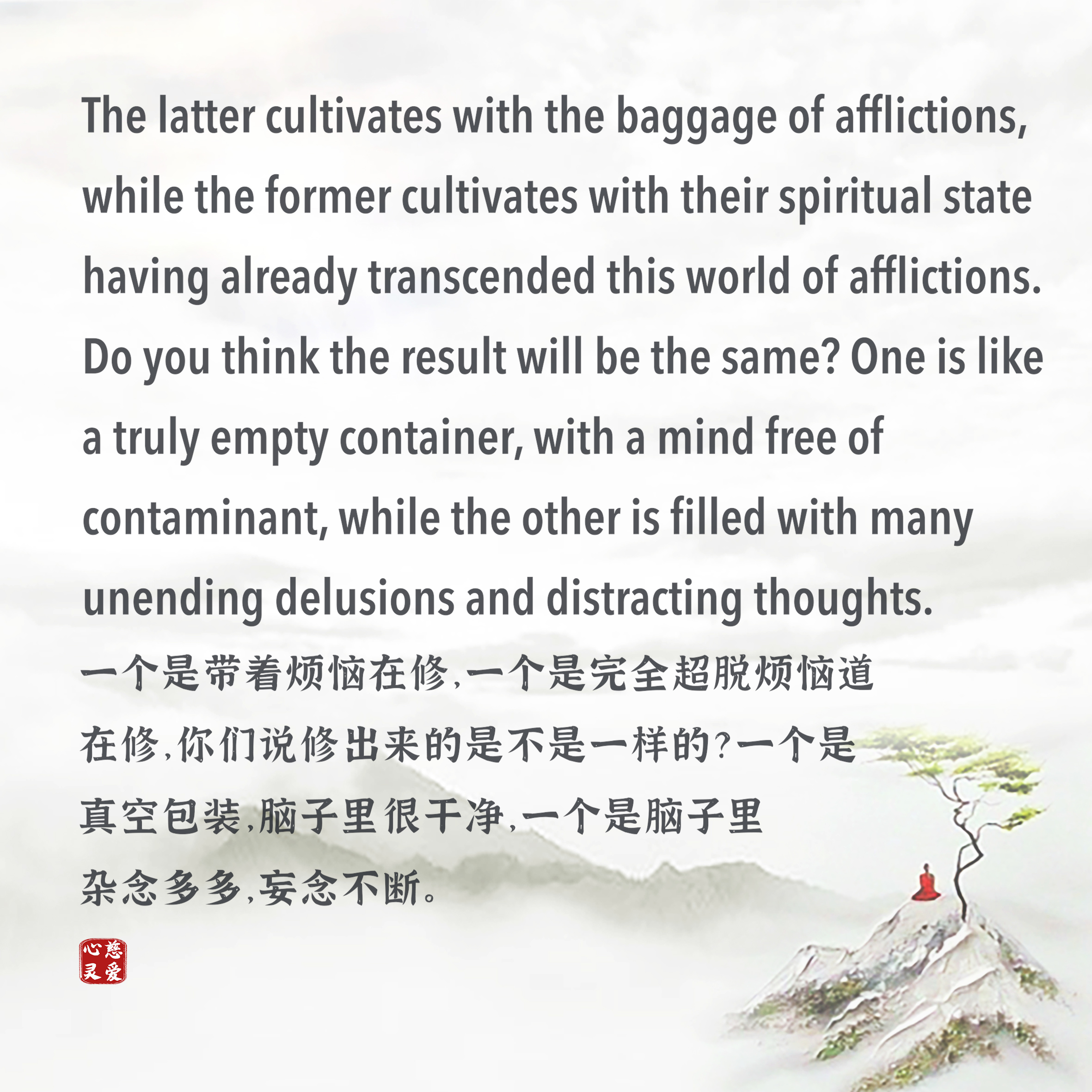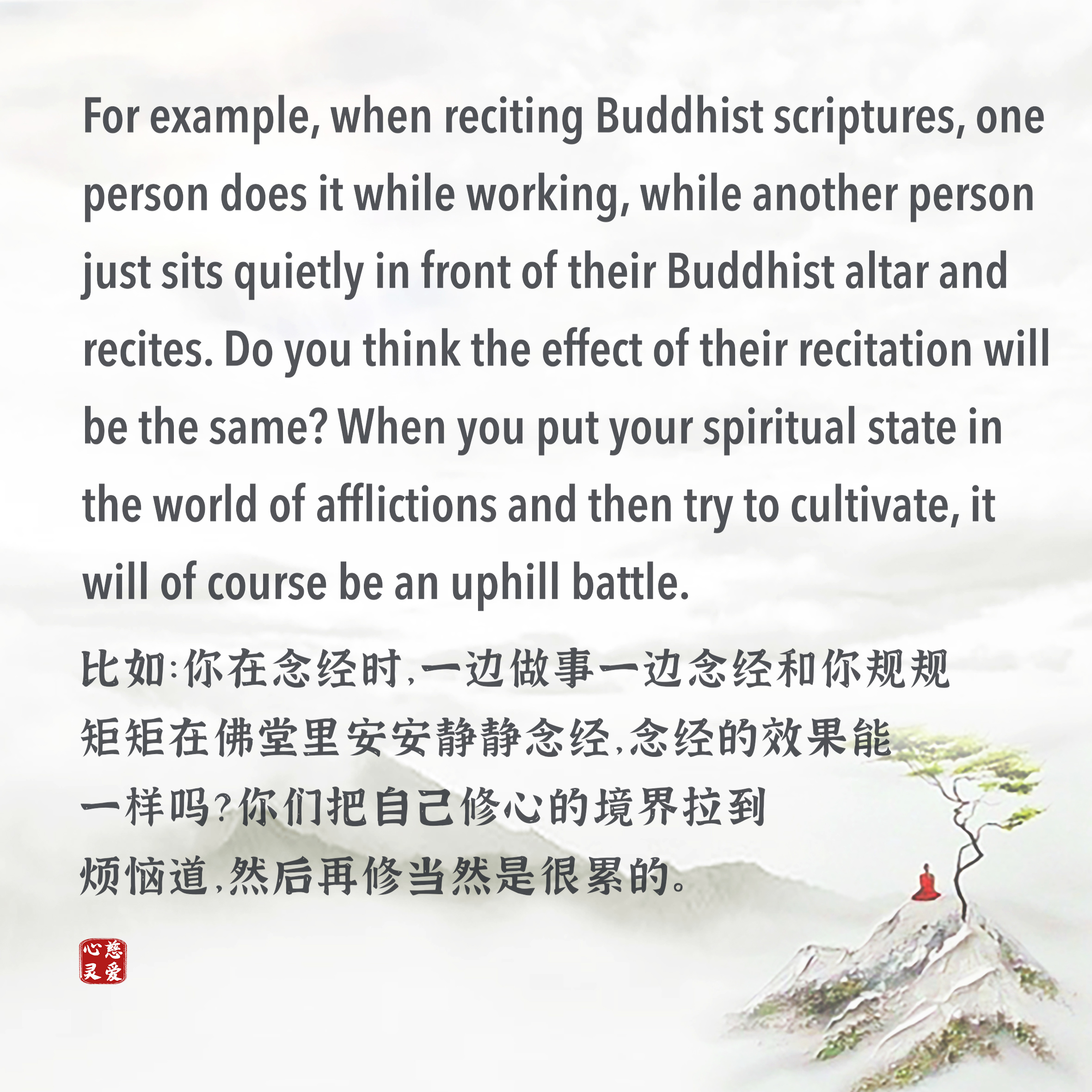Now, I will talk about being a “practitioner”. Every one of us is practising, but what exactly does the term “practitioner” mean? Are you disciples qualified to be practitioners? Those who are qualified must first reach a certain level of spirituality. Firstly, when encountering any kind of suffering or hardship in the world, the practitioner must have the ability to endure it. Their level of spirituality must then gradually increase. Also, after a certain period of time of their practice, practitioners should act in accordance with karmic conditions and not feel pain. When they feel pain, that means they haven’t truly liberated themselves from suffering. Only when their spiritual state elevates to a certain level can they be called a practitioner.
今天给大家讲“修行人”。我们每个人都有修行,那么修行人这几个字到底意味着什么?你们徒弟称不称职?如果是一个修行人,必须要有一个境界,对人间发生任何痛苦事情的时候,都要有承受能力,境界要慢慢提升;而且修行的人,修到一定时期,要随缘要不觉得痛苦,因为当你觉得痛苦时,你还没有真正脱离痛苦。修行的境界要提升到一定的层次,才能被称为修行人。
First, a practitioner must prevent afflictions from arising. So, if you still find afflictions springing up everywhere, that means you are not a true practitioner. For a practitioner, even if afflictions do arise, they should immediately use their wisdom to subdue it within their mind. Then they may be qualified as a practitioner. Why did I use the words “even if afflictions do arise”? It’s because human beings all have the seven emotions and the six sensory pleasures. So when the obstacle created by afflictions emerges, you must eliminate it immediately.
作为修行人,首先要做到不生烦恼,你今天在修行,而烦恼四起,你就不是一个真正的修行人。修行的人,就算烦恼已经生起了,自己要用智慧在心中立刻制止,这才能称得上是修行人。修行人,就算生起烦恼了,为什么说就算生起烦恼了,因为人都有七情六欲,有烦恼障出来时,你要立刻制止。
When we are practising, a demon will arise from our minds. In Buddhism, we refer to this as the demon of afflictions. The more afflictions you have, the greater the demonic obstructions. It is your job to dispel them.
But how do we get rid of the demon of afflictions? You must start by reminding yourself that you’re a practitioner – and therefore different from ordinary people. So you cannot let pain get the better of you. Even if you are in the midst of great suffering, you must subdue it and – gradually – prevent the pain from affecting you. When the demon of afflictions approaches, the best solution is to go with the flow, acting in accordance with your circumstances. Maintain a cool, calm state of mind even in adversity. No matter what disaster befalls you, calm down first of all.
告诉大家我们在修行中心中会有一个魔出来,这个魔在佛法里称为烦恼魔,烦恼越多你的魔障越深。必须把这个魔障驱除。如何消除烦恼魔?首先要想到自己是一个修行人,和别人不一样,不能痛苦,就算痛苦来了也要制止,而且要慢慢不觉得痛苦。
烦恼魔来时,最好的方法是要顺境,顺着境界走。逆境来时也要保持平静不起波浪,不管什么灾难来了,先平静下来,心中不起波浪,其实这就是佛法里讲的禅定。禅定是修学佛法里比较高的境界。如果没有定力,人间的一切都能使你起烦恼。
The mind must not have any fluctuations. This is known as Chan (Zen) meditation in Buddhism. Chan meditation is a higher-level state in Buddhist practice. Without the power of concentration, everything in the world can make you worry. I hope you can also learn a bit of Chan meditation in your practice of Buddhism. That’s because Chan meditation allows us to calm our chaotic minds. Do not get to the bottom of anything in the world, and instead learn the essence of Chan meditation, a spiritual state. Whether the external conditions are favourable or unfavourable, we must always act in accordance with the circumstances. With a calm mind, you can have no fluctuations within. It is like a river making waves as it flows, and then when it reaches the ocean, there’s not a single wave. A person with meditative concentration has a mind as broad as the ocean, which can accommodate every turbulent, breaking wave it encounters, subduing all of them. To attain meditative concentration, one must let their mind become calm and settled.
希望你们能修学一点佛法里的禅定。禅定能让混乱的思绪平静下来,任何人间事不能深究,我们要学禅的精神,禅的精神就是境界,不论是顺境还是逆境,他都是顺着境走,用一颗平静的心,心中不起波涛。犹如小河里的水滚滚而来,一流到大海里,什么波浪都没有了。有禅定的人,心就犹如大海一样宽广能容纳汹涌的波涛,而不起浪花。禅定必须自己先稳住,才能定。
Let your mind and your energy flow effortlessly. The energy field one’s mind creates must be allowed to move and flow effortlessly. Do not try to stop the flow of your energy field. For example, when somebody is very angry and unhappy, stopping them from losing their temper or showing their emotions will cause them to get sick. Therefore, you should allow them to get all of the emotion out. Let them say what they want to say and expend their energy. Afterwards, they will be fine. If you stop them from expending their energy, what happens next is troublesome and they become susceptible to major illnesses like cancer or liver-related diseases. The energy emanated by the mind should be left to flow freely. Follow its flow, and cultivate your mind. People who have truly attained a certain spiritual state won’t even allow the circulation of the flow to affect their energy. Without giving rise to the energy, there is no need to put in effort to move it.
In addition, it’s not the case that when you encounter unwholesome conditions, you quit cultivating. Nor is it the case that when you encounter wholesome conditions, you stop your cultivation. Neither is correct. Regardless of the situation, you should still cultivate diligently.
心气任运。一个人的心所产生的气场就任由它去运作,任由它去运动,不要阻止自己的气场。比如:当一个人很不开心在生气时,如果你阻止他不要发脾气,不要难过等等,接下来他就会生病,让他去讲,让他去发泄,发完了就没事了。如果阻止他这个气场向外发泄,接下来就有麻烦了,最容易生癌症,或各种肝病。心中的气场随运走,走到哪里就应该修到哪里,而真正有境界是不让运去影响你的气,气不生出来,也用不着来运了;另外并不是厄运来时,就不修了,或好运来时就不修了,这都是不对的,应该是不论好运还是厄运都要好好修。
“Constantly dwelling in clear enlightenment”. Once you attain clear enlightenment, your attachment to things will be dissolved. A person who clings to things as if they are real does not see the true picture. A person who attains understanding never clings to anything. “Constantly dwelling in clear enlightenment” means they are eternally clear and enlightened, so that they can keep the Buddha and the Buddha-nature constantly. For those who are ignorant and not awakened, they will never be constantly enlightened. Therefore, they won’t be able to retain their Buddha-nature. In layman’s terms, it’s a case of: “I understand it thoroughly.” And once you do, you won’t be selfish. You regard fame and fortune as less important, then you understand, and then you become enlightened. It’s that kind of eternity that can truly take root in your mind, and it’s what it means to be “constantly dwelling”.
明觉恒住。明白了,觉悟了之后,首先能减少执著,因为执著的人是不明白道理的,明白道理的人绝对不会执著。明觉恒住,就是永恒的明白,永恒的觉悟,然后才能将佛常住,才能留住佛性,如果不明白,没有开悟的人,是不能永恒觉悟的,是留不住佛性的。用人间的话讲“看透了”,看透了,不自私了,看淡名利了,你就明白了,就觉悟了,这个永恒在心里才能站住脚,这叫恒住。
Remember: “Everything comes and goes naturally. Everything that exists in the chiliocosm, whether good or bad, naturally comes and naturally goes. It appears from a state of emptiness, and then returns to a state of emptiness. If you think that way regularly, then your mind will have no fluctuations. You will then understand that everything that happens, and everything that you encounter, is simply a natural phenomenon. You will realise that the reason for the hardships and the karma you’re experiencing right now is that you did not cultivate yourself in the past life. It’s therefore only natural that you undergo retribution in this lifetime. Once you realise it, are you going to cling to anything? Without such attachment, your intellect and your wisdom can dwell in the world eternally.
你们要记住:“一切自然来,一切自然去”。大千世界的一切事物无论好坏都是自然来去的,来也空空,去也空空,如果你能经常这样想,你心中就不会起波涛,会明白身上所发生、所接触的事情都是一种很自然的现象,会明白现在受苦是因为前世没有修,所以今世受报是很自然的,你说还会再执著吗?心中不执著,你聪明的智慧就永恒住世人间了。
You must distance yourself from desire and from seeking. Think about it: what can we truly obtain? If you can’t obtain what you desire, you will only get suffering and afflictions instead. Seeking to obtain something that clearly does not belong to you is in fact very painful. I hope that practitioners in the Human Realm can forget completely about their desire and their seeking. Desire brings nothing but suffering; and seeking will not deliver what is meant for you. Only what comes to you naturally is truly meant for you.
要离开渴望求取,渴望是非常饥渴希望得到,想想看人能得到什么?如果得不到渴望的东西,换来的就是痛苦和烦恼。求取,明明不是你的,想获取,但求时是非常痛苦的。希望在人间修行的人,把渴望求取全部忘掉。渴望换来的就是痛苦,求取换来的不是你的,自然来的才是你的。
Remove any thought the very instant it arises. Don’t let it linger in your mind, or it will bring you disaster. According to Buddhism, anything – or any rise of thought – can be removed in a flash. However, most of you would allow that thought to run wild inside your head. When a selfish thought, a greedy thought or any unwholesome thought arises and you let it continue unchecked, it will be trouble. For example, imagine a good friend telling you that they won some money by gambling. You then think to yourself: “To be honest, I may also have a bit of luck.” When this thought appears, you must remove it, immediately. “I mustn’t think that way, let alone act upon it. It’s not right. I absolutely must not do it!” Another analogy: You use a marker to write on a whiteboard. Though the ink is black, you are able to easily erase what you just wrote with your hand. However, if you wait a few seconds longer, it will become harder to wipe off.
任何念头的升起,均能在一刹那驱除,不要令它残留在心中,因为残留在心中之后就会给你带来劫难。任何事物,任何念头的升起,佛法里讲可以在瞬间驱除,可是你们是任由念头在大脑中翱翔,当一个私心,当一个贪念,当一个很不好的念头在脑子里升起时随它去,那就麻烦了。比如,当听到一个好朋友赌博赢了钱,脑子里就会一下子想到自己,实际上我也有这运气的,当这念头一出来,你马上要把它驱除,我不能这样想,更不能去做,是不可以的,我绝对不能做,要一下子把这个念头消除。又比如:用水笔在黑板上写字,就算是黑色的墨水,当你刚刚写上去时用手很容易擦去,但是几秒钟之后,就不容易擦去了。当有不好的念头升起时,就会在你的八识田中种下不好的因,菩萨教我们一个驱除的方法,当你有不好的念头时和想法时,当你愤怒时,你要趁它刚刚出来的一瞬间马上驱除,如果能在瞬间驱除,你就是一个智者。当一个不好的念头升起时,就会在心中生一个恶果,不要让它残留在心中,所以菩萨教我们要快断除,如果残留在心中就会给你造成孽影。
When an unwholesome thought arises, it sows an unwholesome seed of karma in your Eighth Consciousness. The Bodhisattvas teach us a method to remove it: the moment you have an unwholesome thought, or you are about to get angry, you must dispel it right away. If you can, you are a wise person. The instant an evil thought arises in your mind, it bears the fruit of negative karma. Therefore, Bodhisattvas teach us to dispel it as soon as we can, otherwise it will linger and carry the shadow of karma in your mind. Many disciples are cultivating themselves, but their minds are yet to transcend this mundane world as they move along the path of cultivation. Remember: one should transcend this world. To transcend means, essentially, to awaken. When you cultivate after awakening, your experiences will be distinctly different compared to those who are yet to be liberated from their afflictions in the Human Realm. The latter cultivates with the baggage of afflictions, while the former cultivates with their spiritual state having already transcended this world of afflictions. Do you think the result will be the same? One is like a truly empty container, with a mind free of contaminant, while the other is filled with many unending delusions and distracting thoughts. For example, when reciting Buddhist scriptures, one person does it while working, while another person just sits quietly in front of their Buddhist altar and recites. Do you think the effect of their recitation will be the same? When you put your spiritual state in the world of afflictions and then try to cultivate, it will of course be an uphill battle.
一般人在没有证道和开悟之前,诽谤他人开悟法门,将有百劫,轮回一千个生,百世断佛性。一般的人在没有开悟,还没有得到佛菩萨这个道之前,他没有开悟,他如果诽谤开悟法门,一定有恶果。开悟法门是普遍讲的,不是专指某一个法门,你不开悟你就没有这个法门,你开悟之后就得到这个法门。你诽谤它,你有百劫(一劫为一个受难),一千个生,百世断佛性。如果一个人诽谤一个正道,他有一百个劫难,有一千个生死轮回,投生一百世没有佛性了,再也看不到佛性了。就像投胎到畜生道一样。
没开悟的人实际上是没有得到这个境界,没有境界的人不要去给他讲法。师父给你们讲,许多弟子在修,但是他们的脑子是没有超脱凡尘的修,应该把人世间的凡尘超脱,超脱实际就是开悟,开悟之后的修,修出来的感觉和没有脱离人间的烦恼道的人在修,那是两个截然不同的概念。一个是带着烦恼在修,一个是完全超脱烦恼道在修,你们说修出来的是不是一样的?一个是真空包装,脑子里很干净,一个是脑子里杂念多多,妄念不断。比如:你在念经时,一边做事一边念经和你规规矩矩在佛堂里安安静静念经,念经的效果能一样吗?你们把自己修心的境界拉到烦恼道,然后再修当然是很累的。
